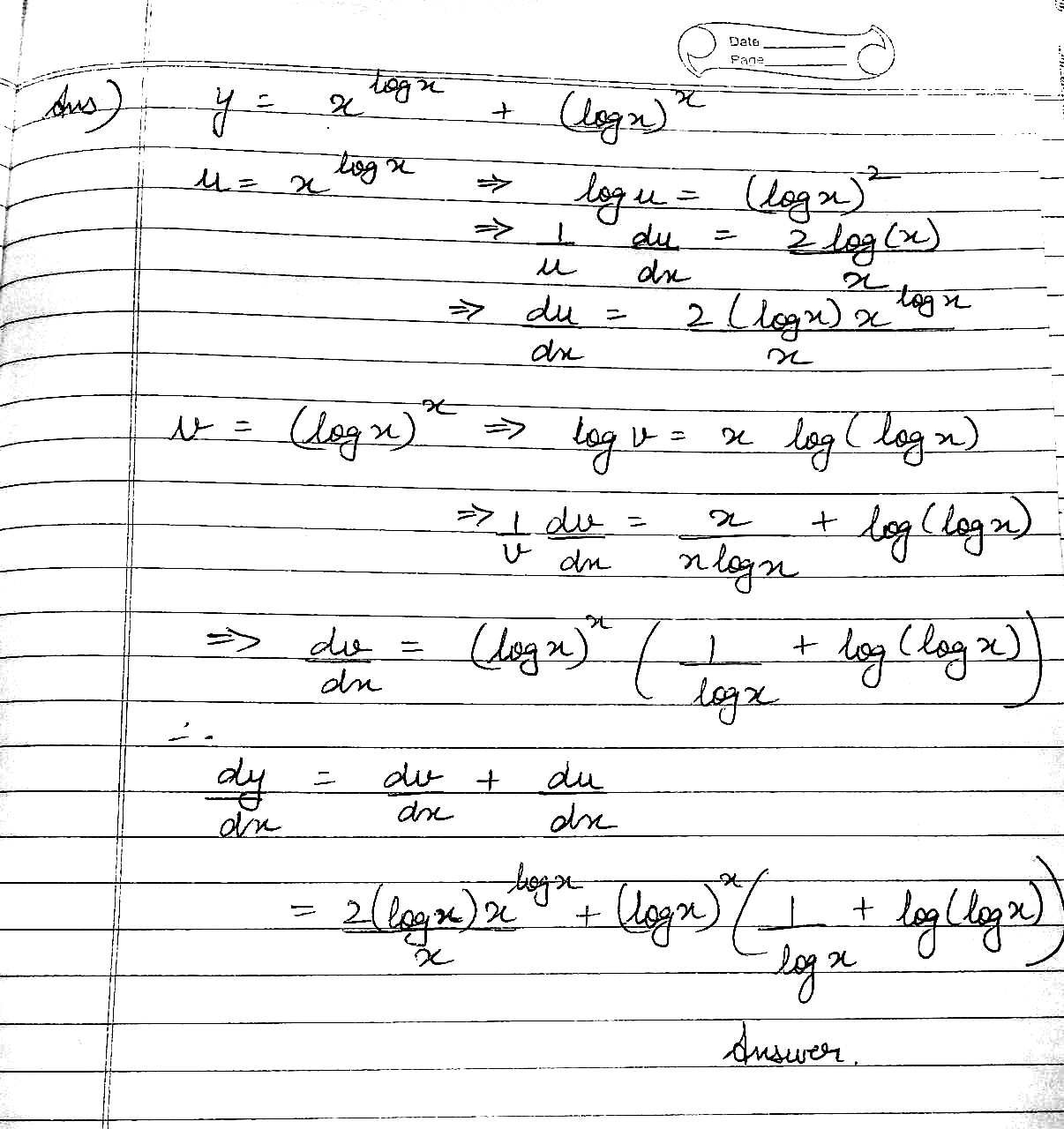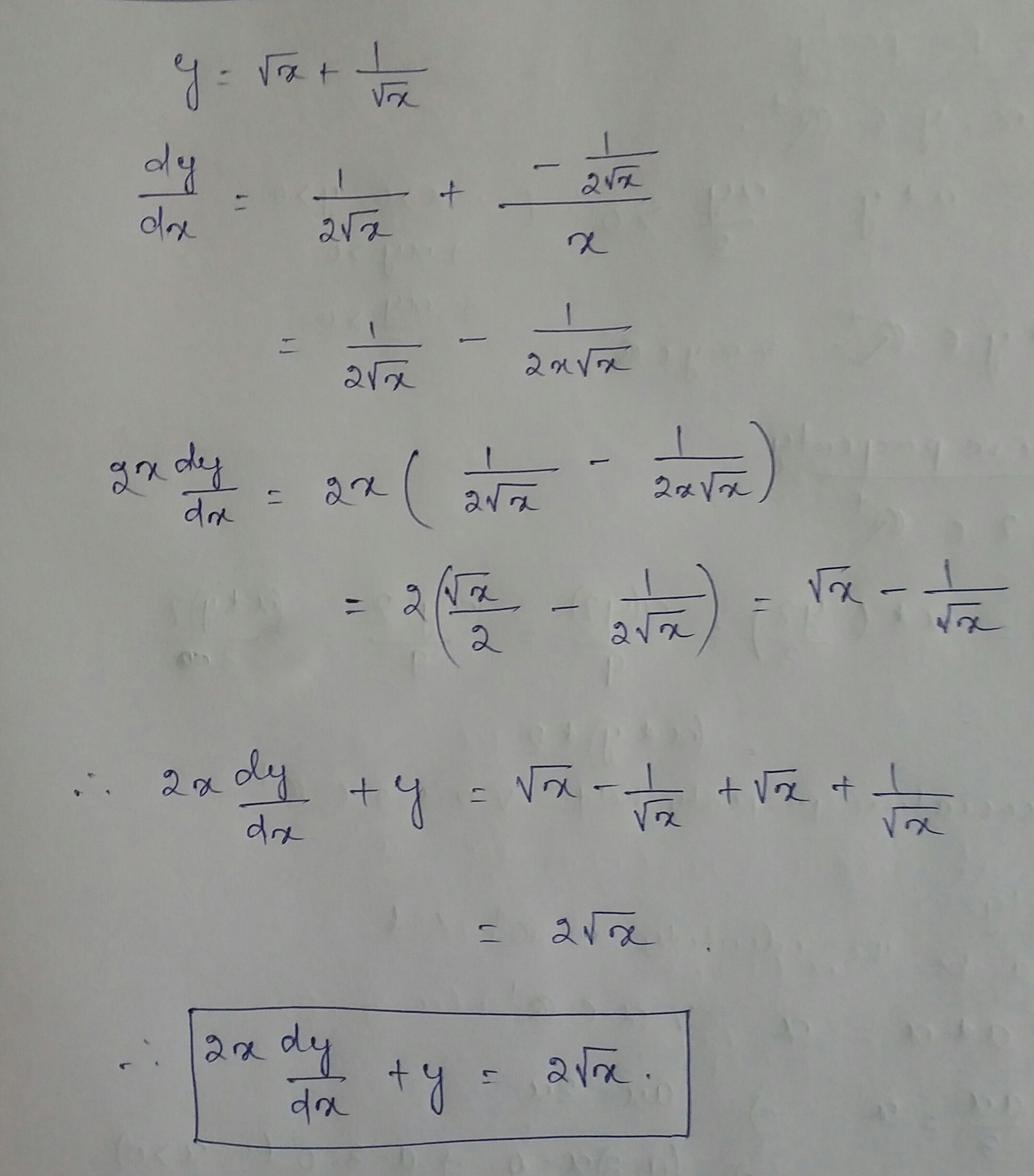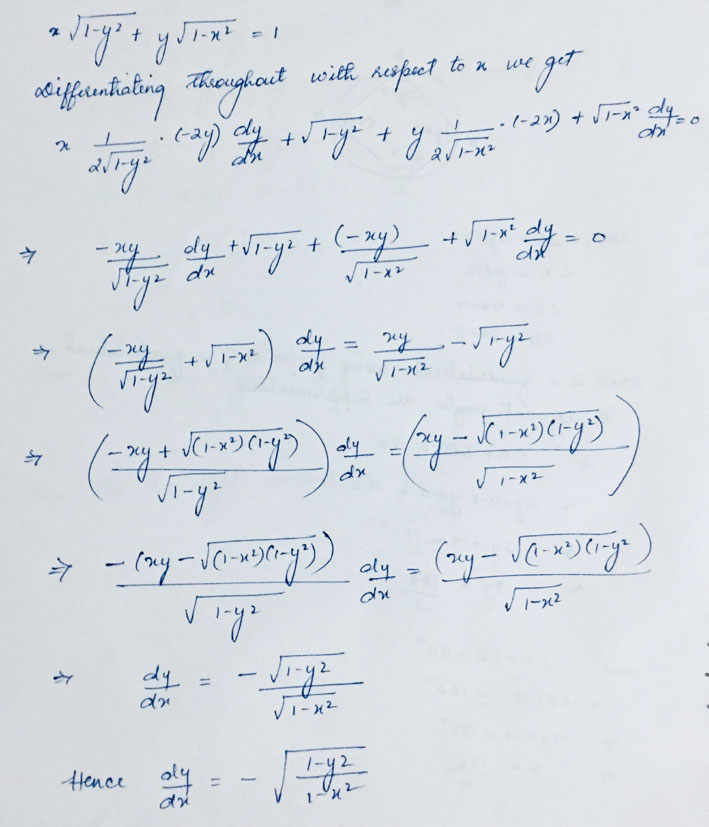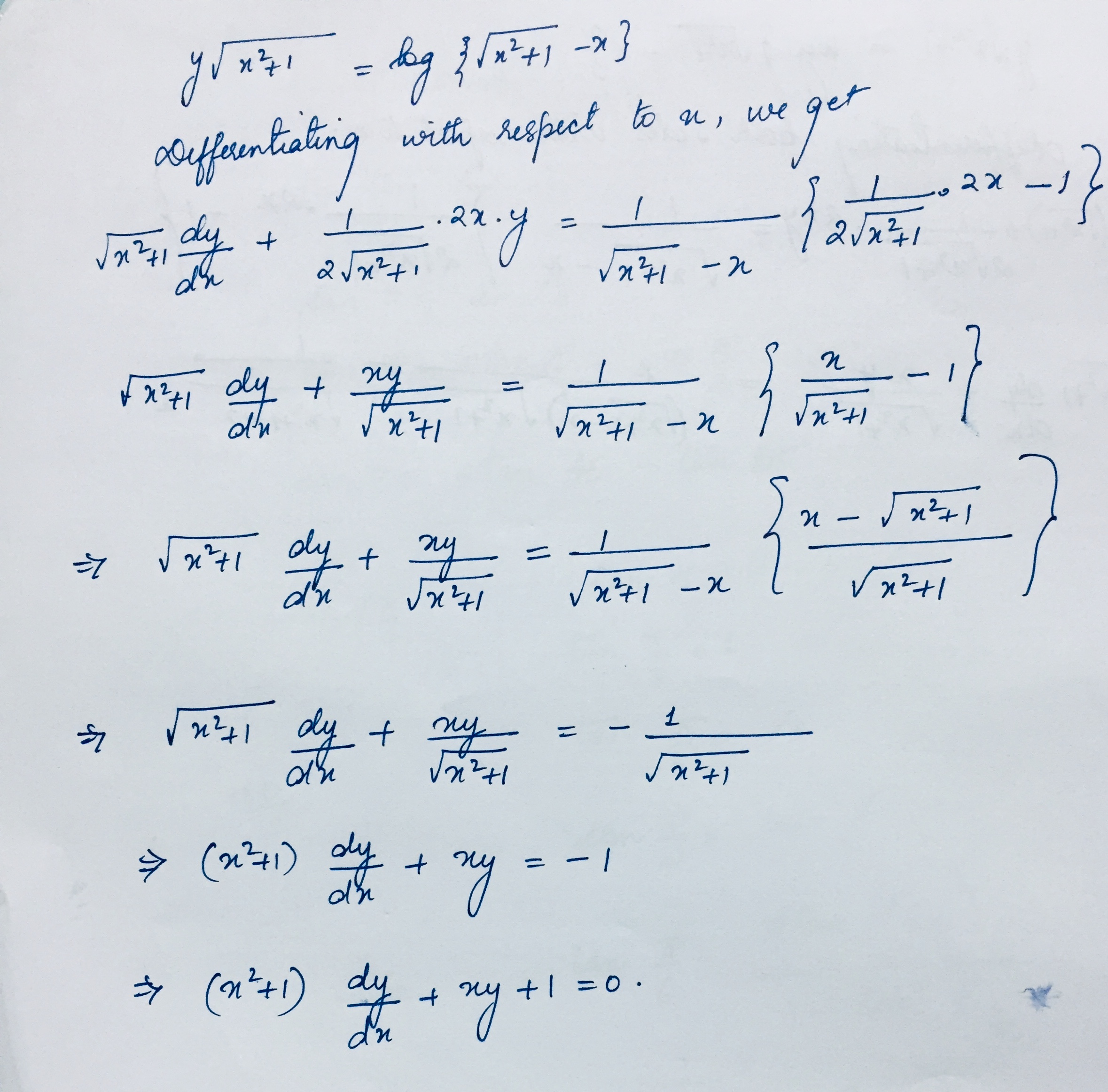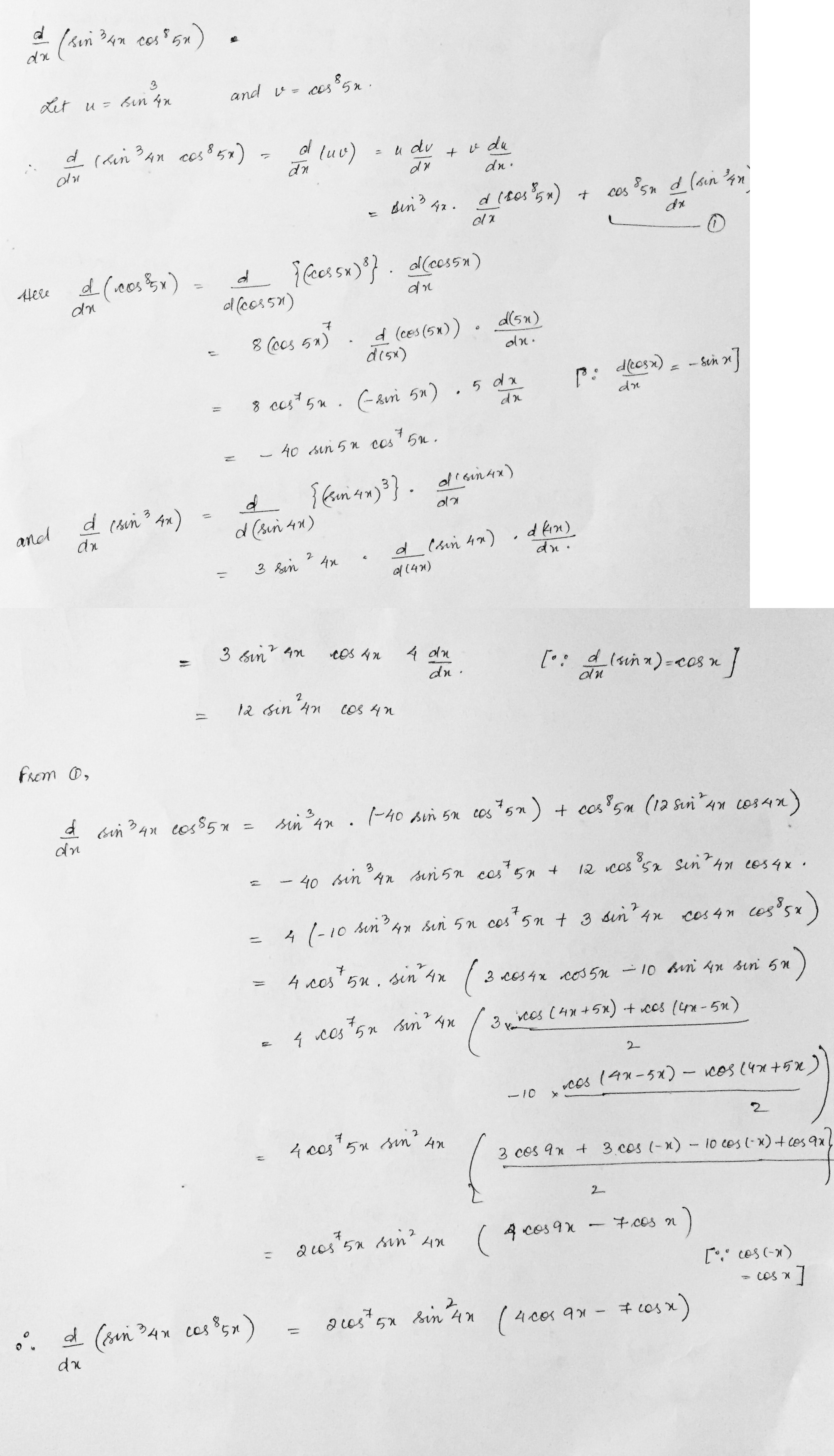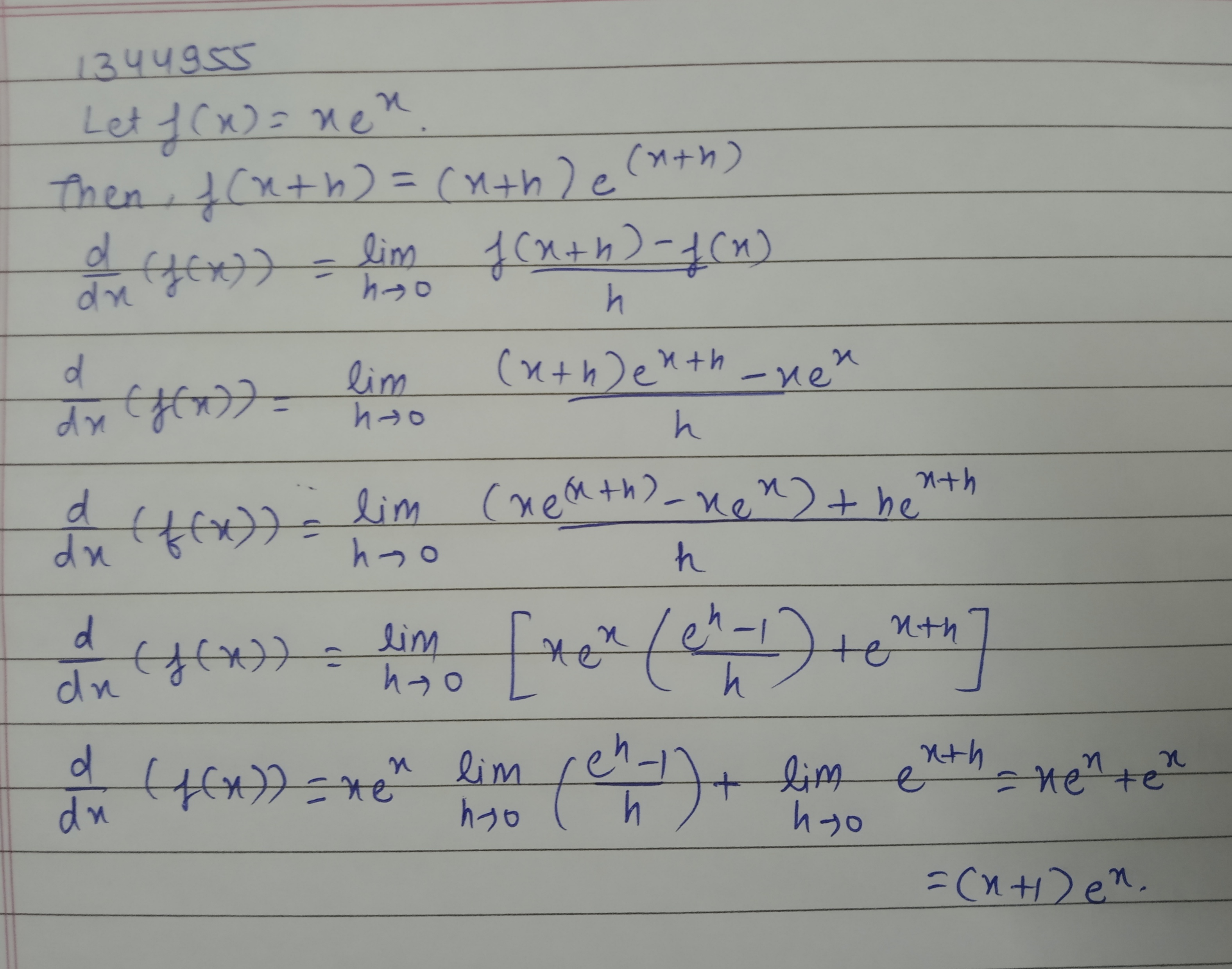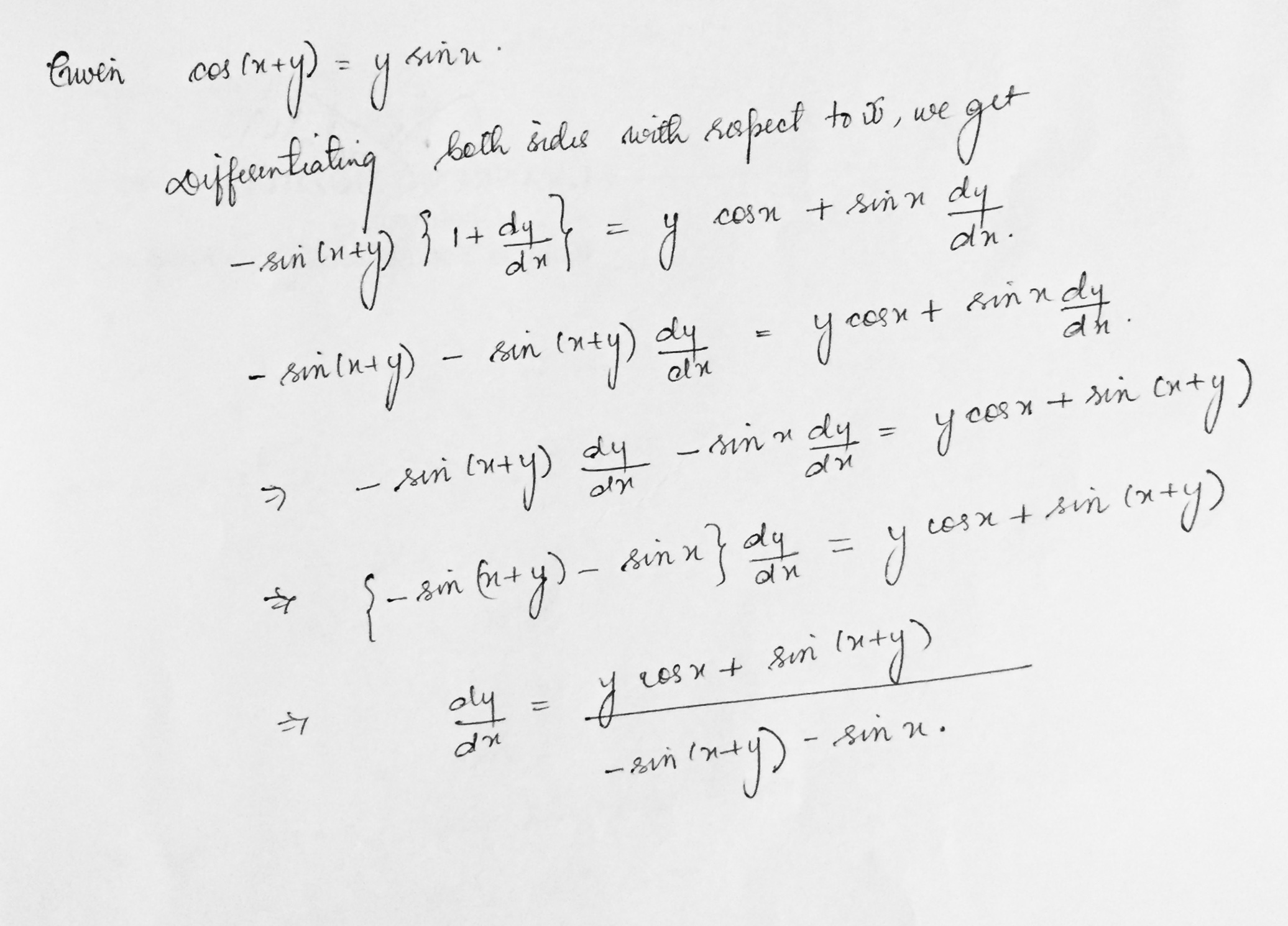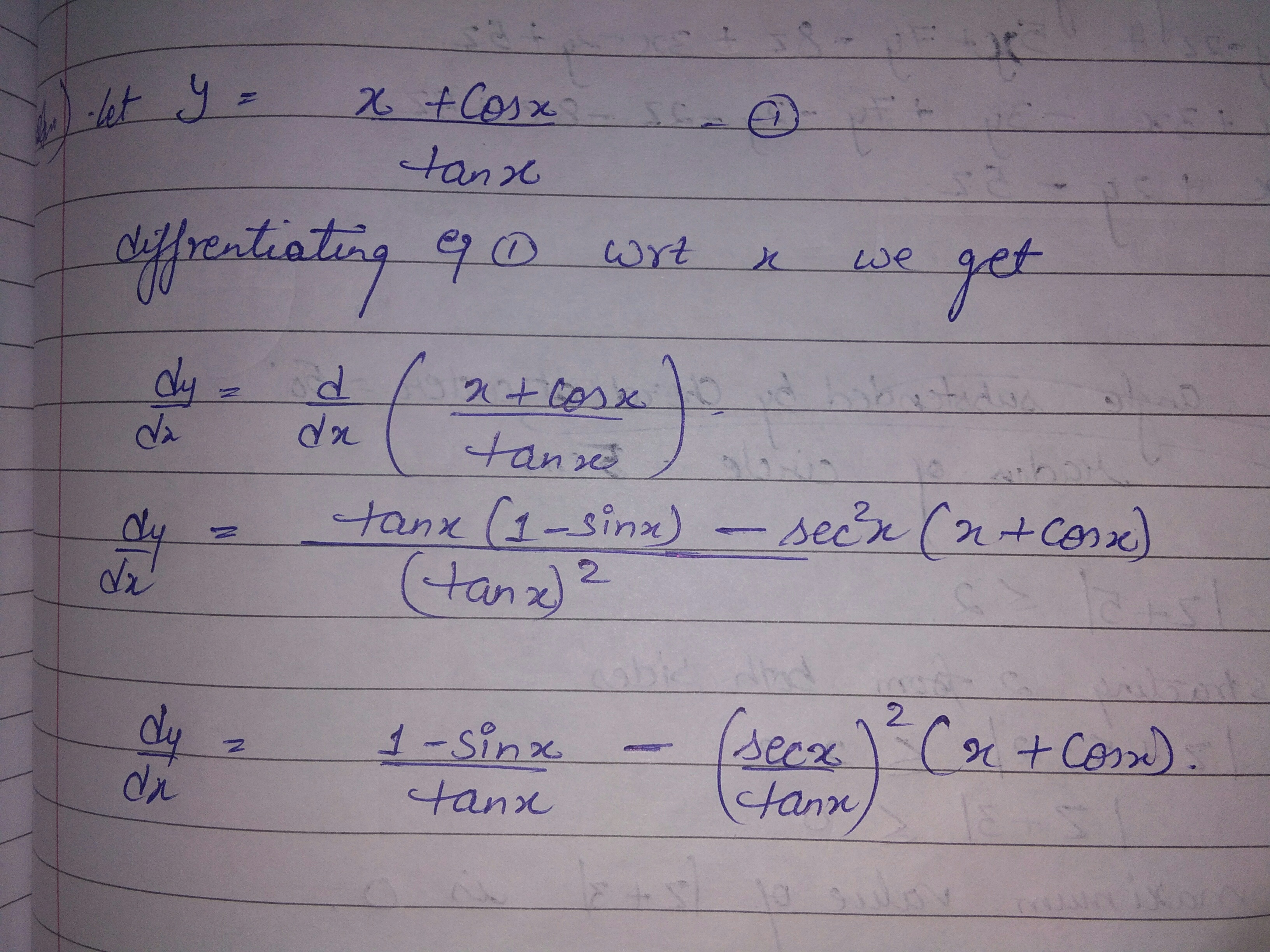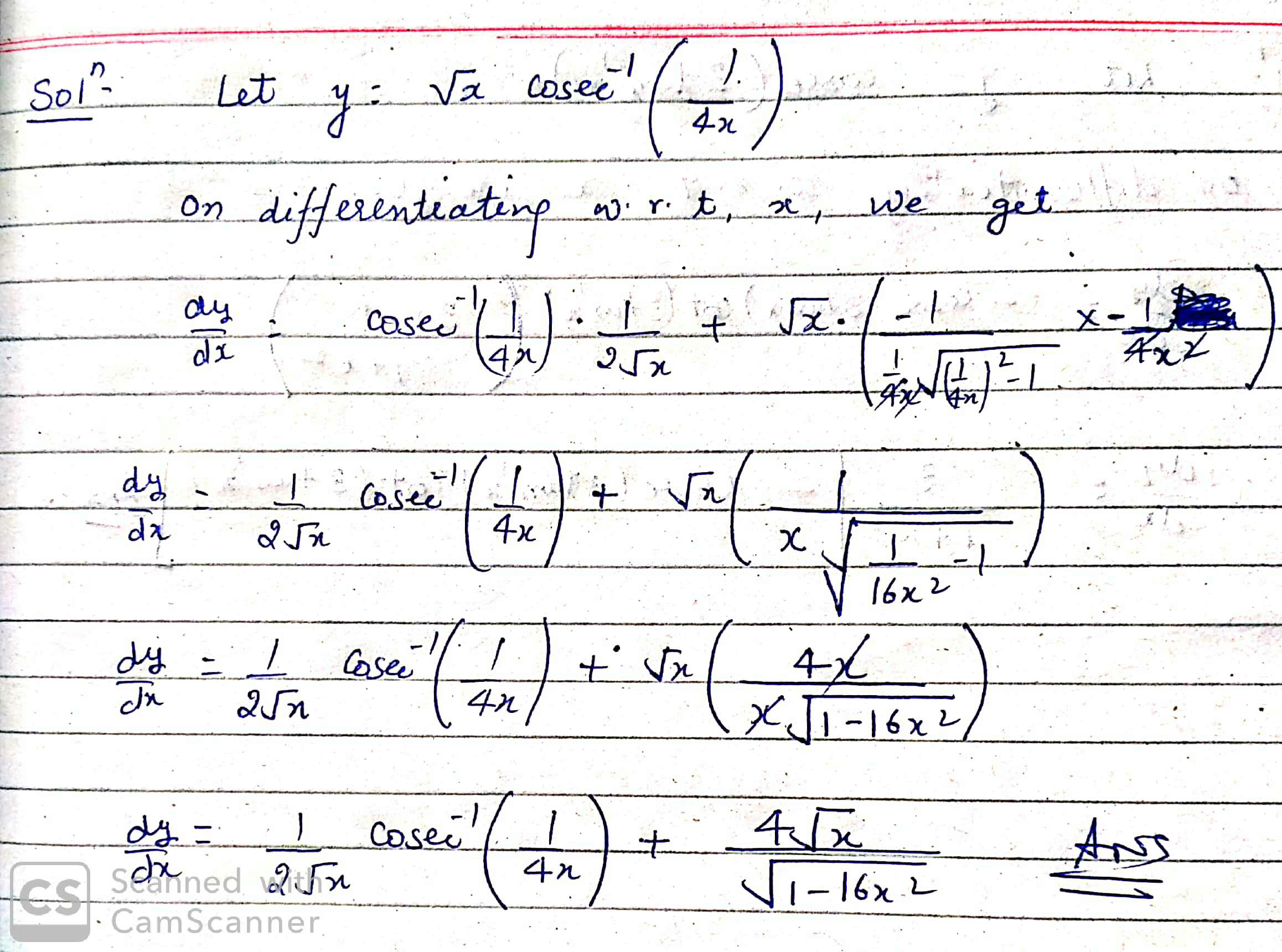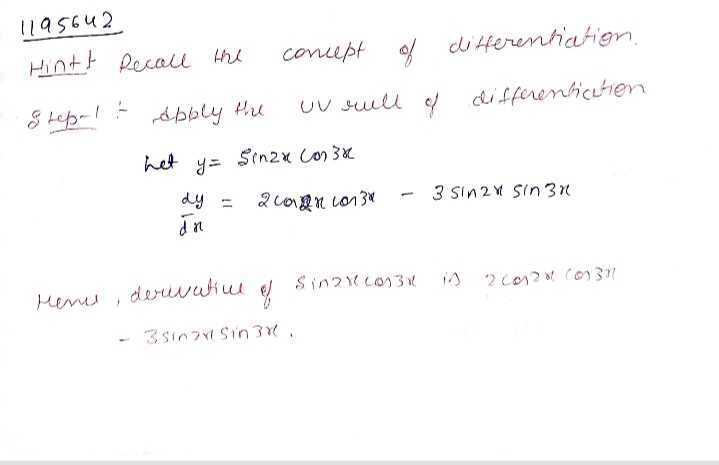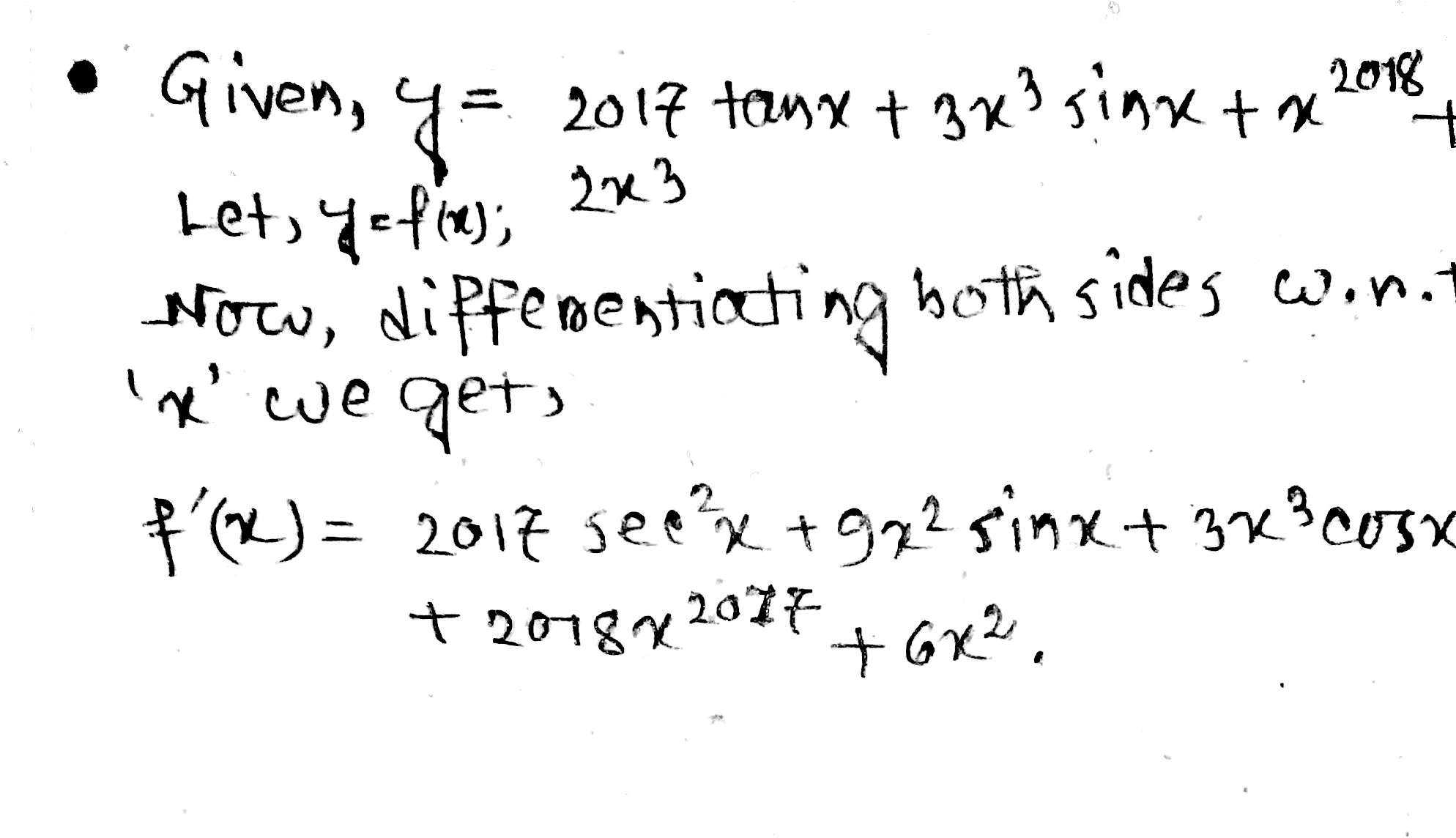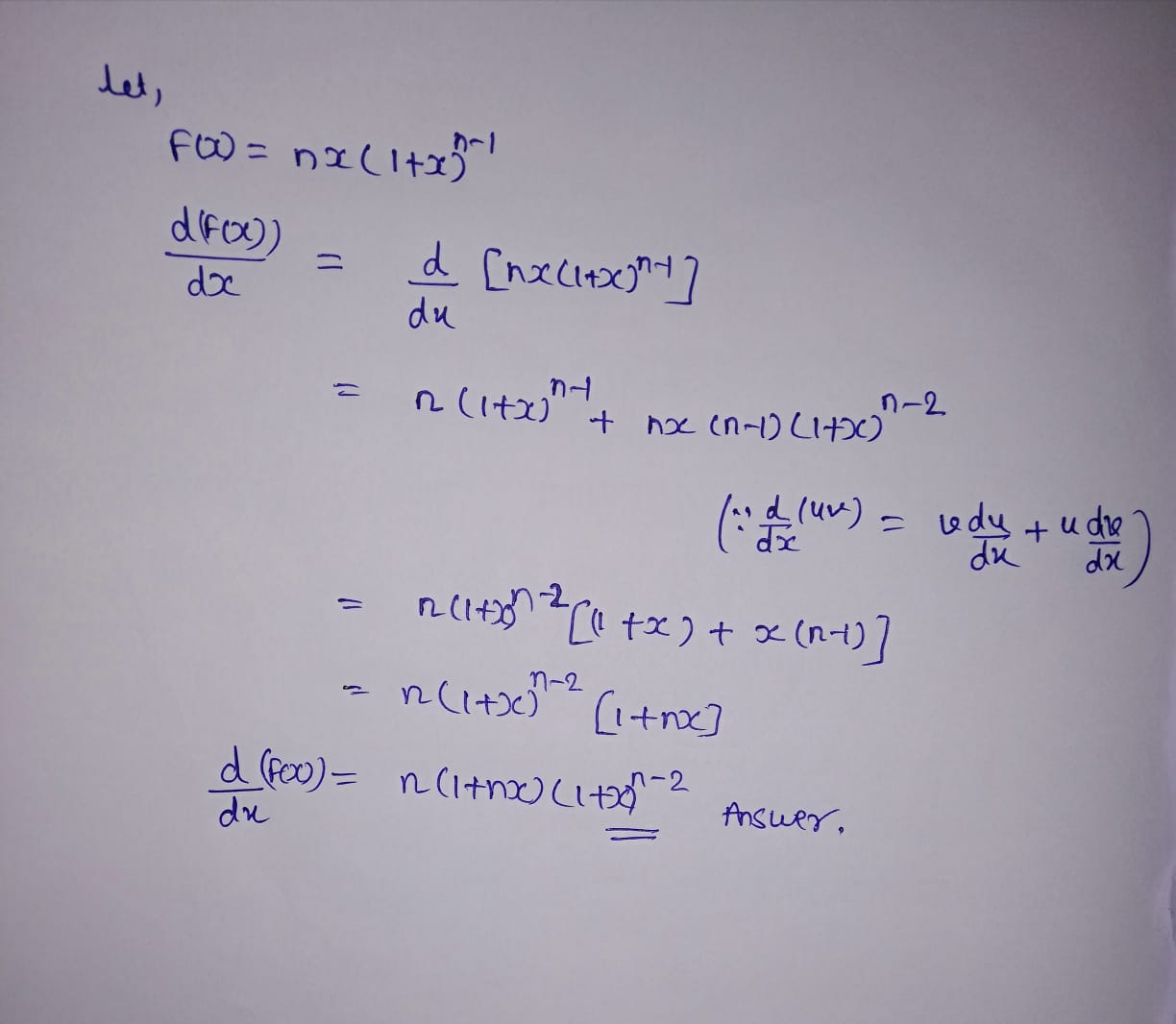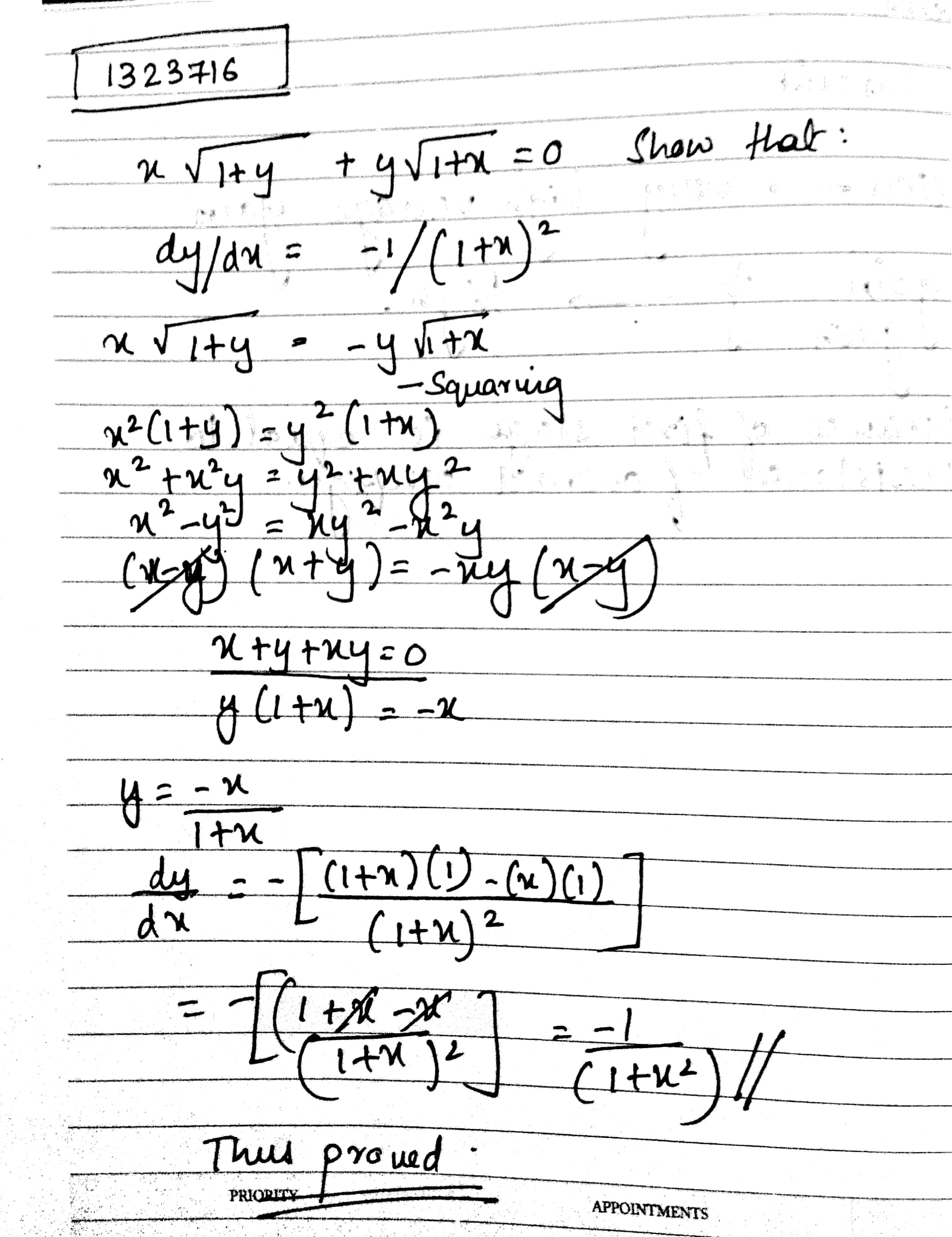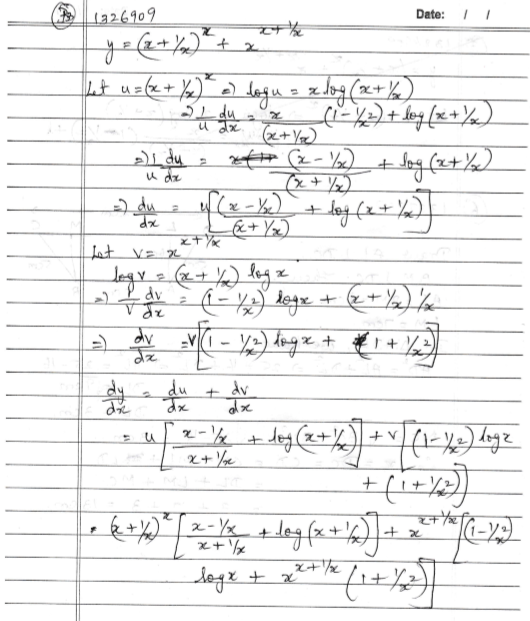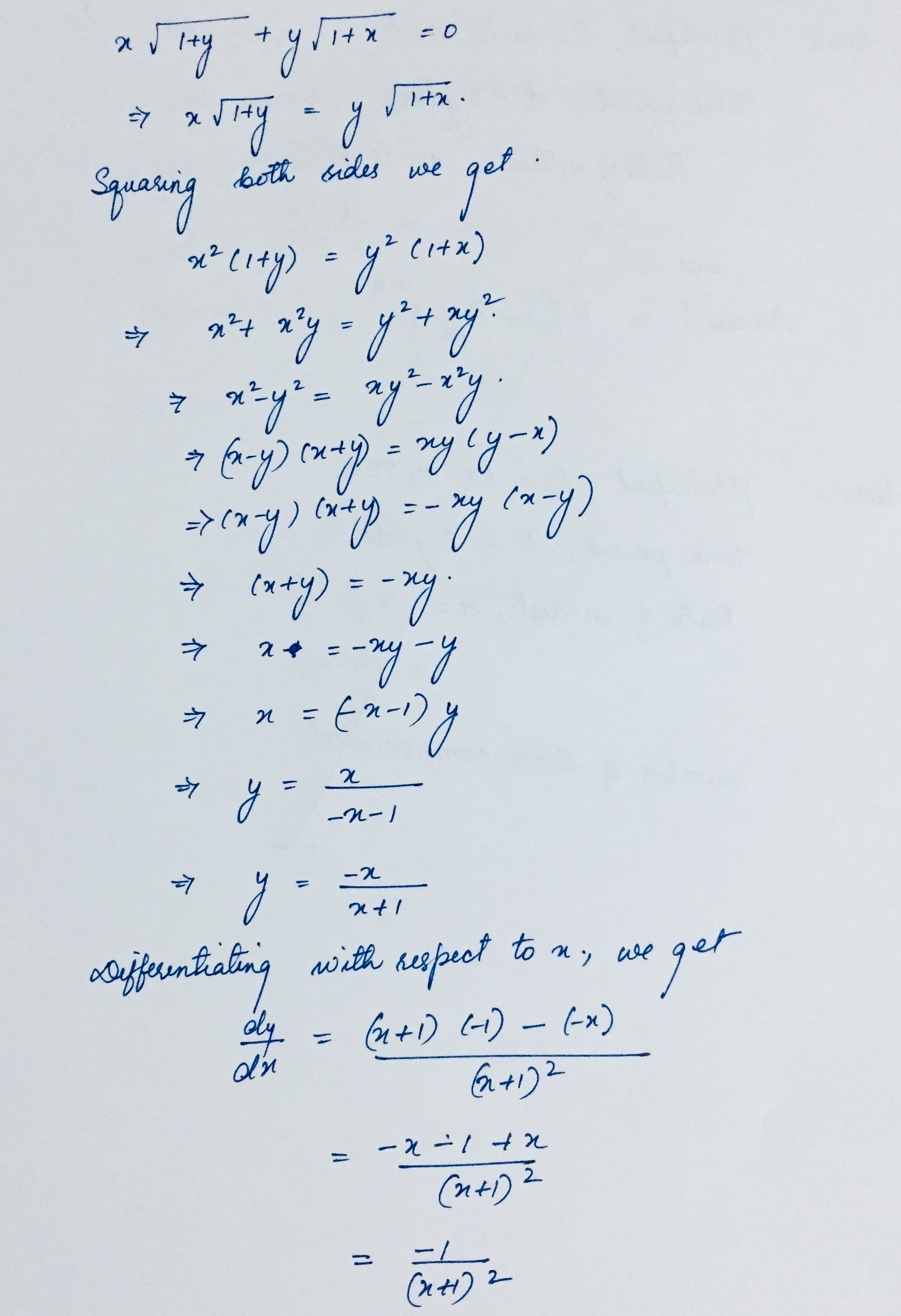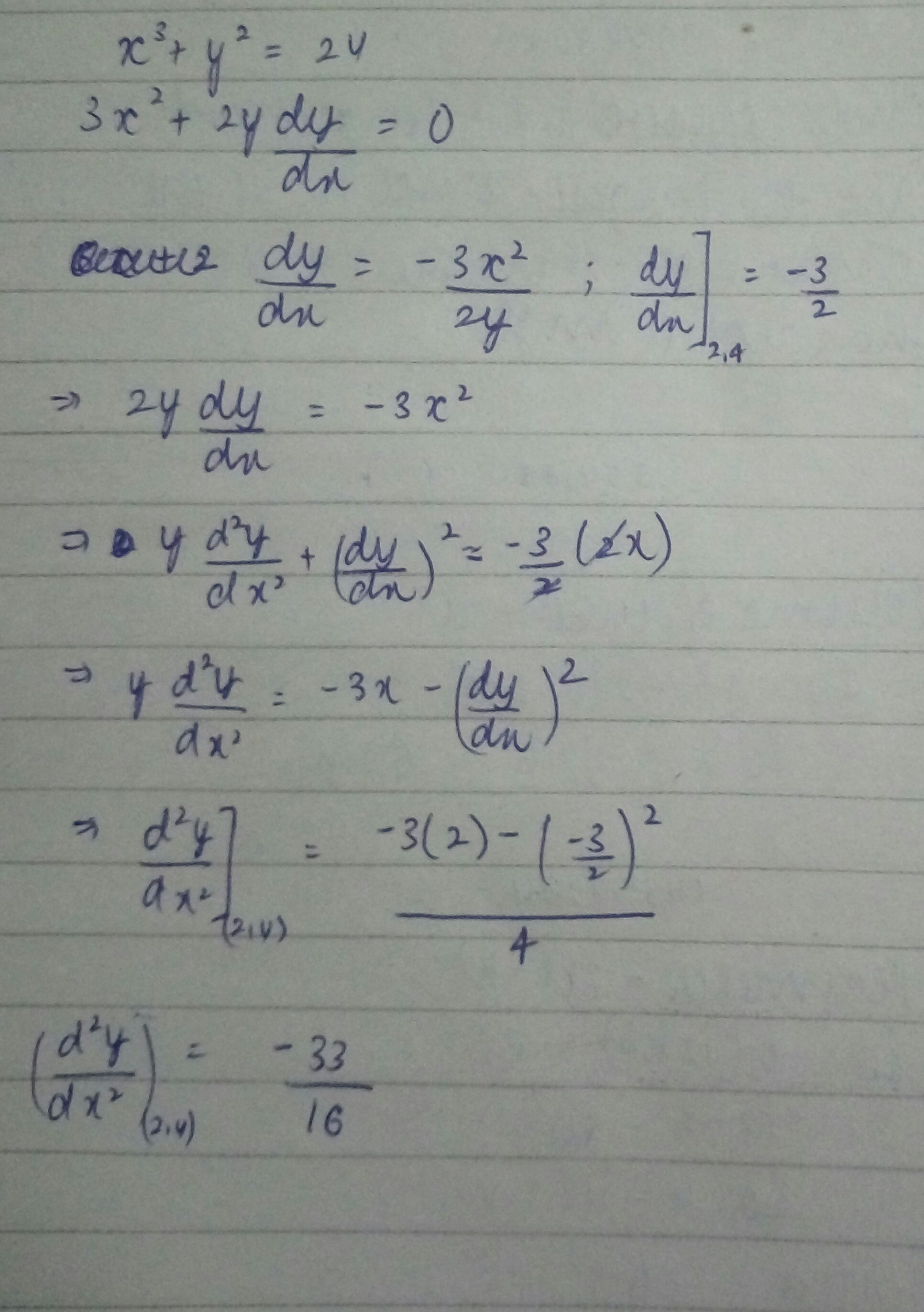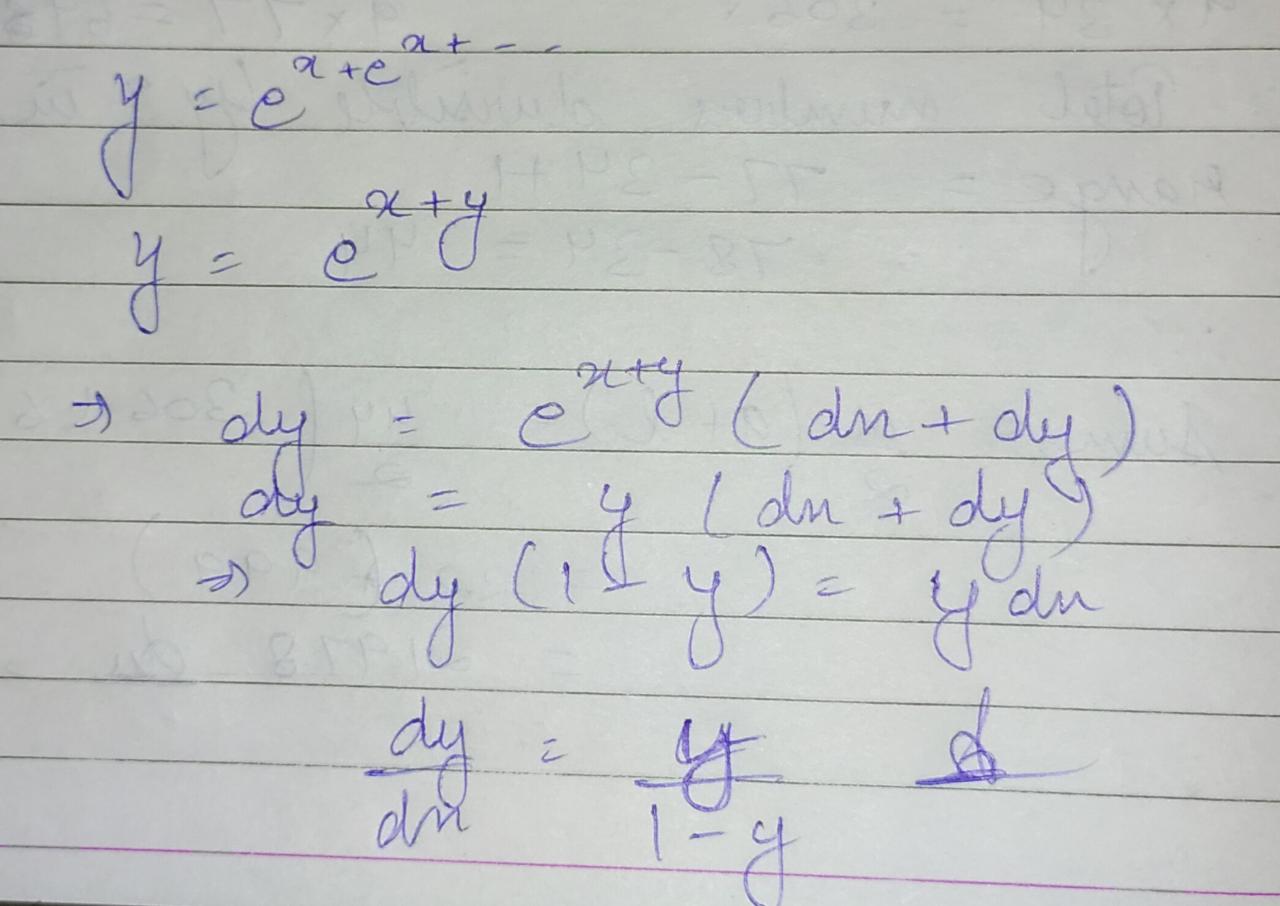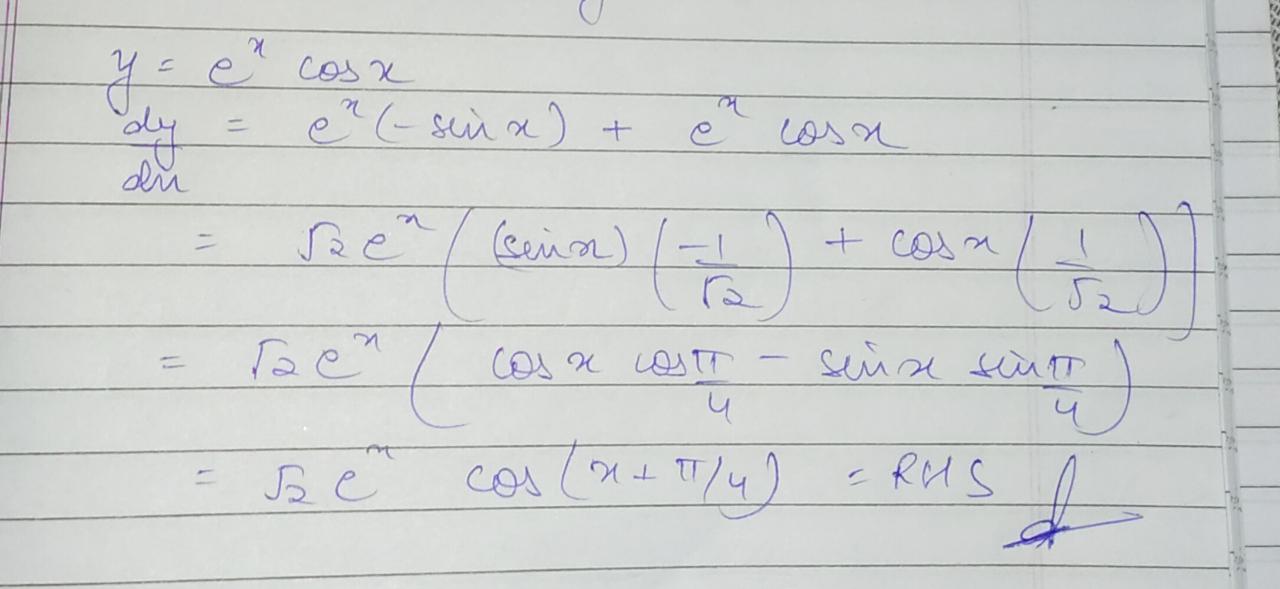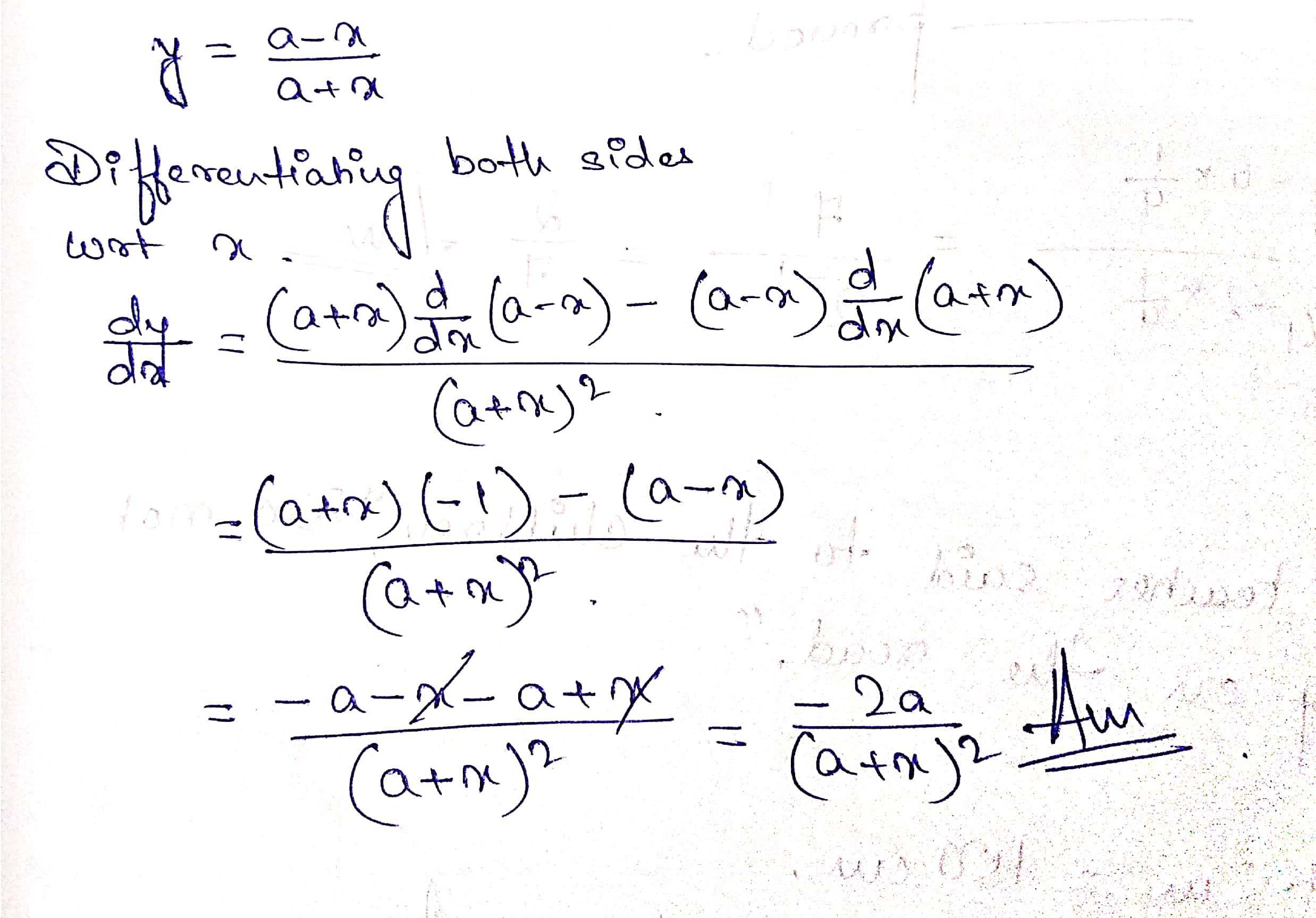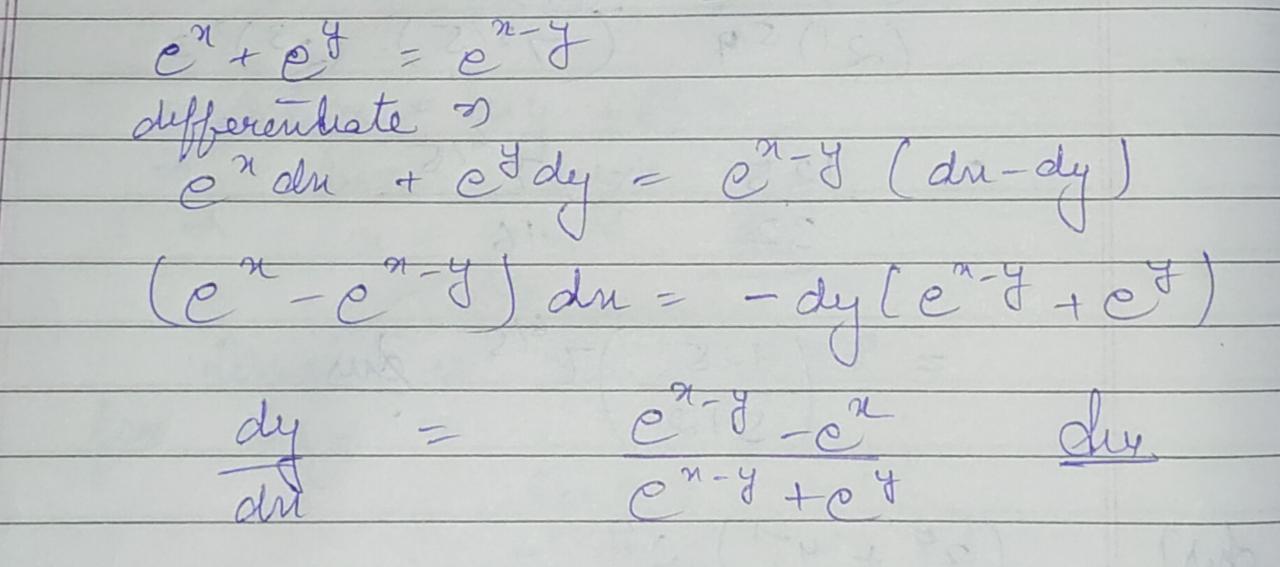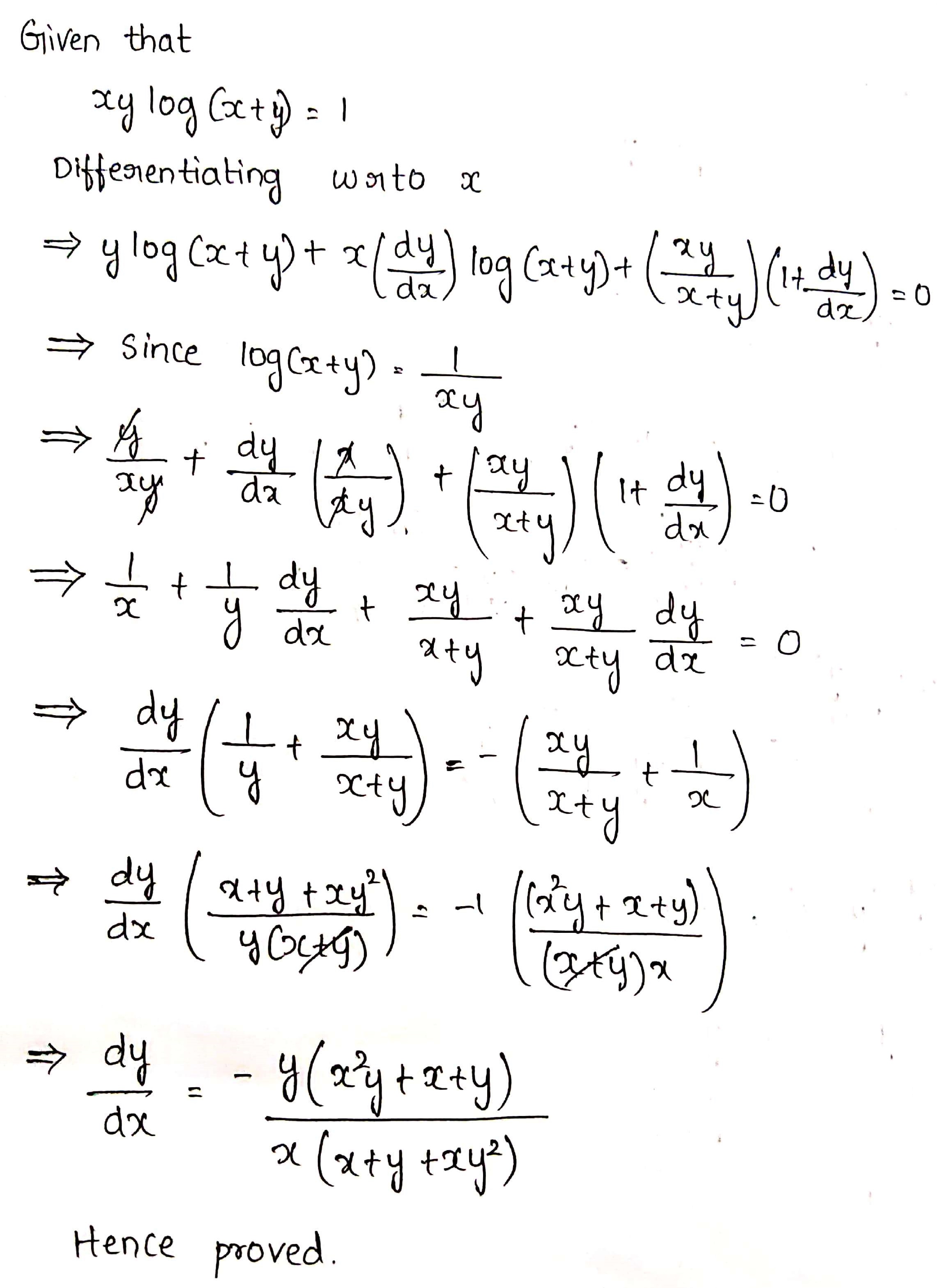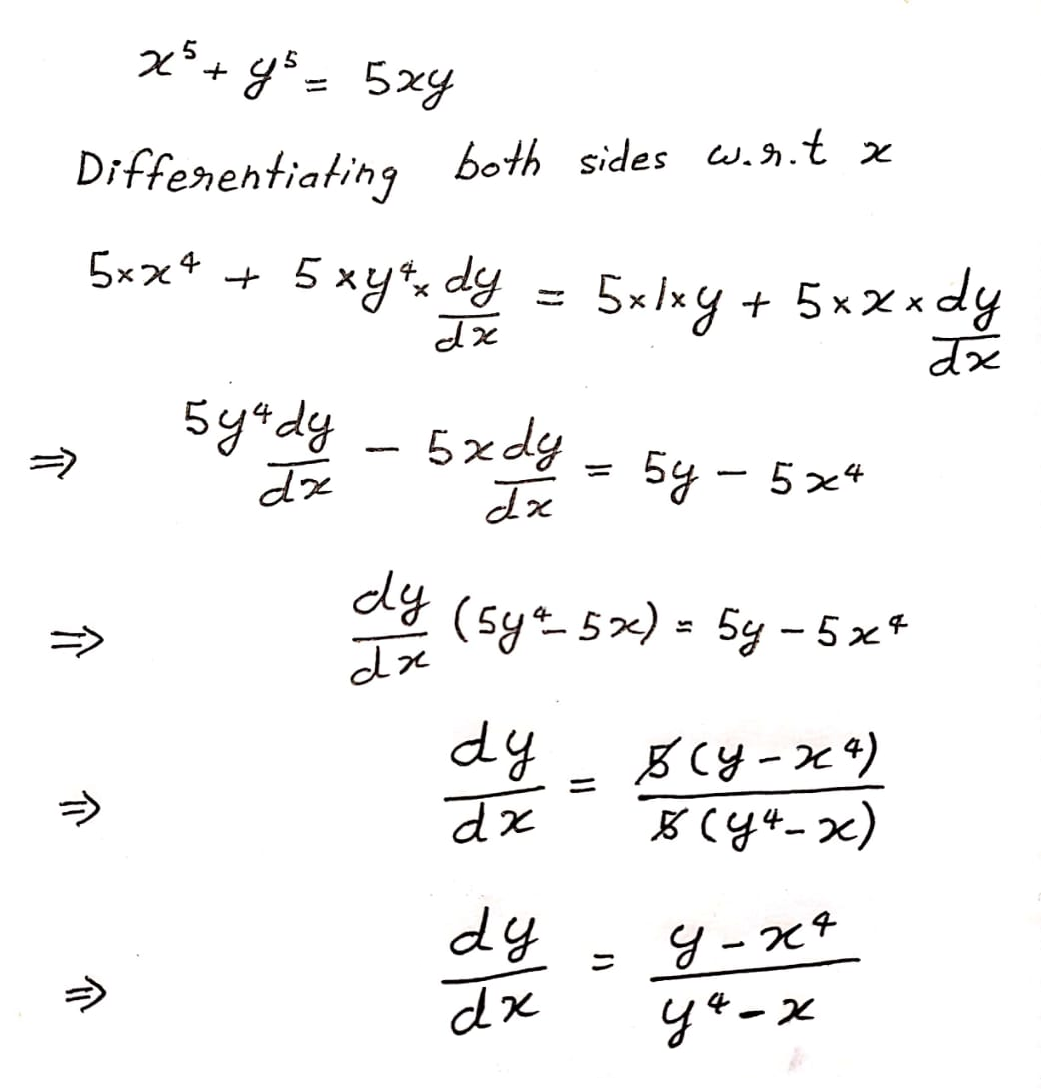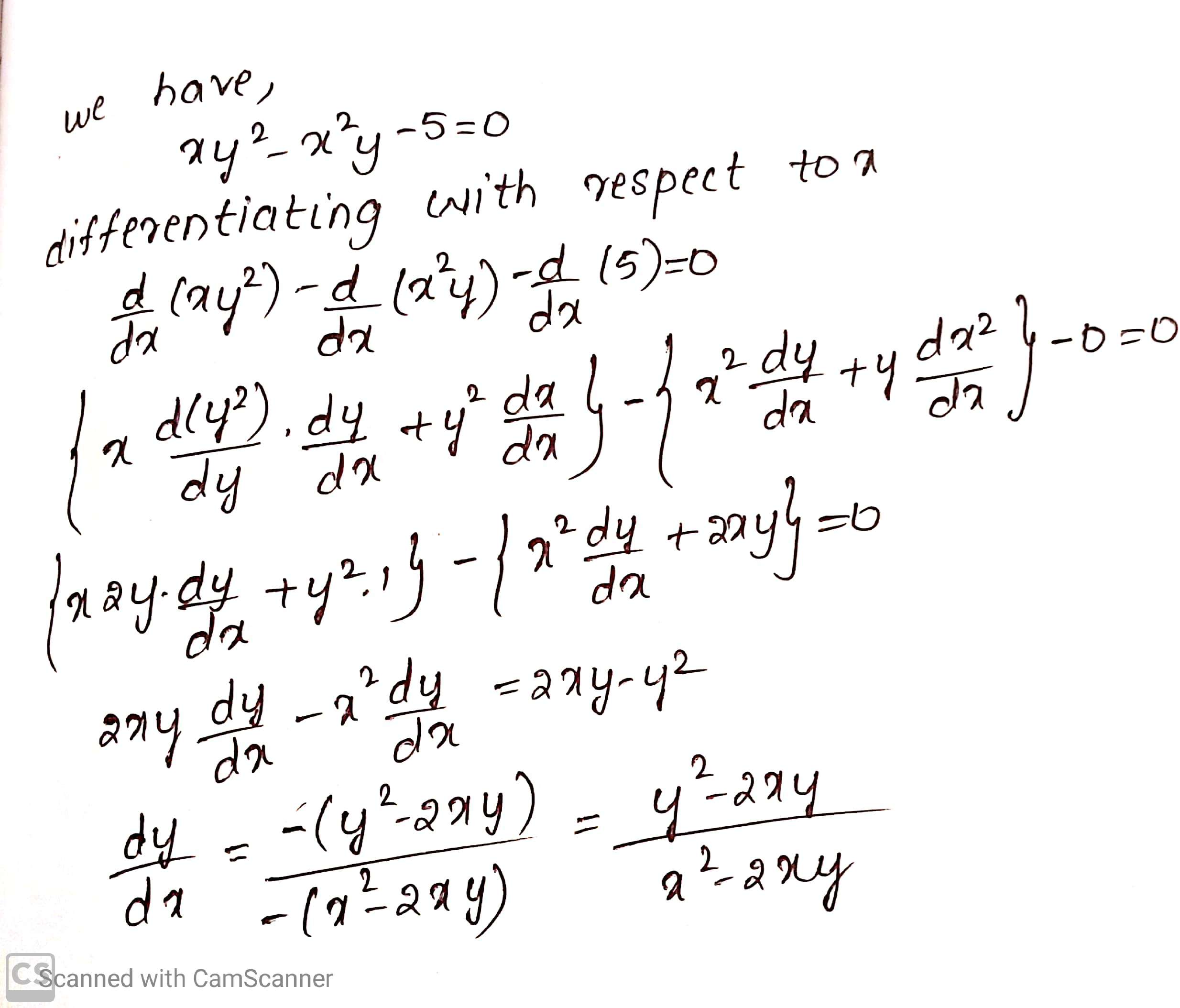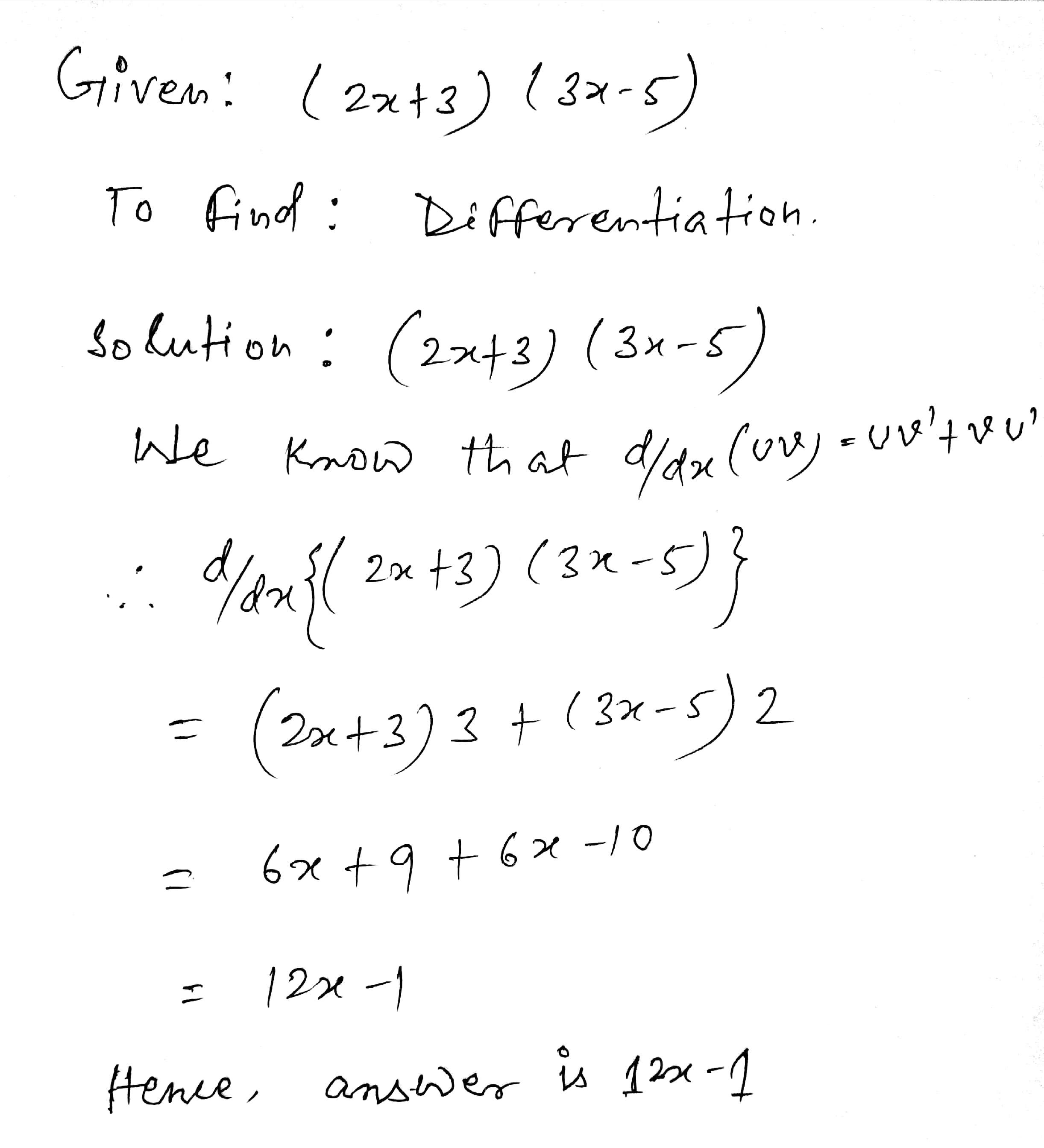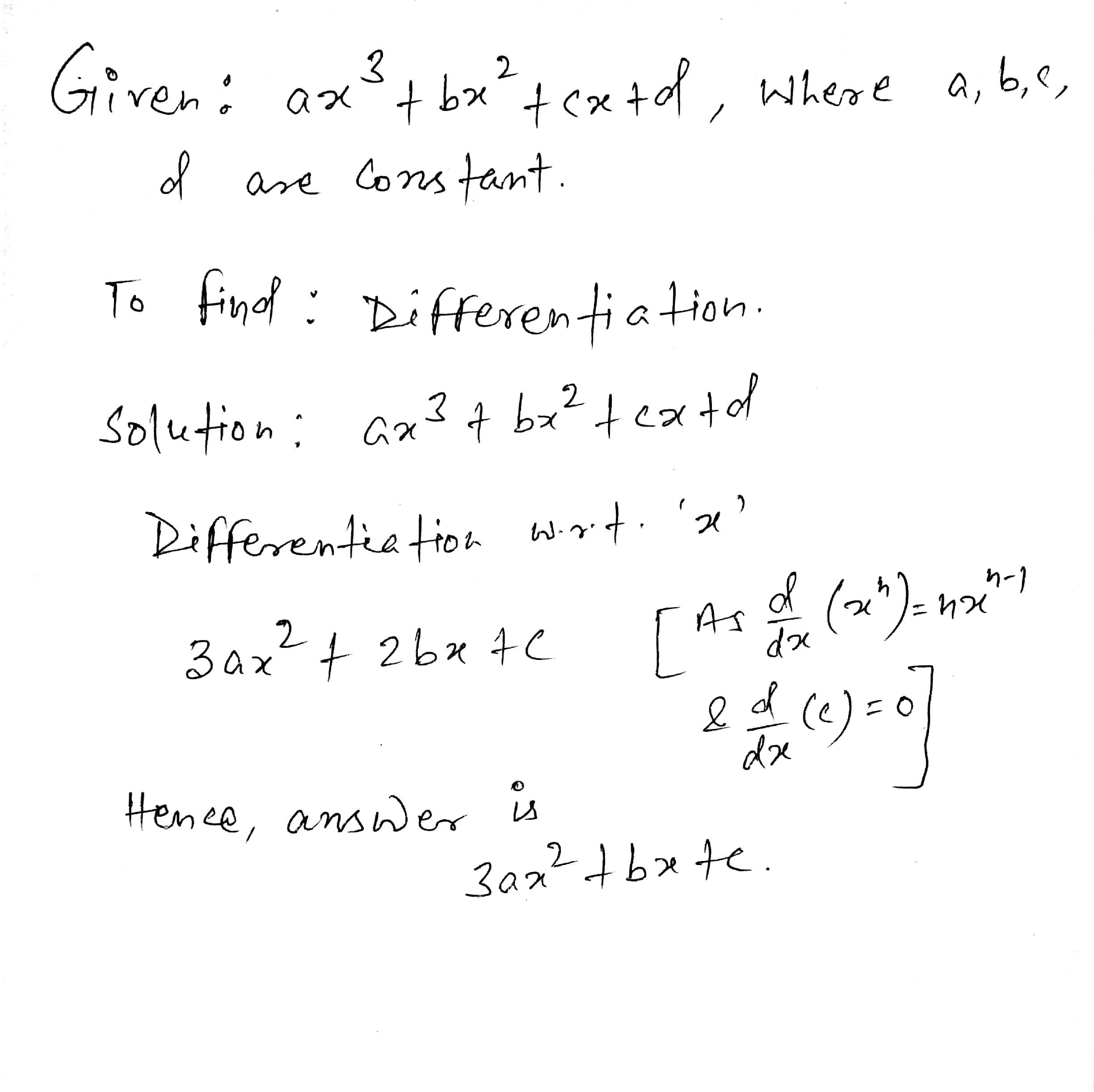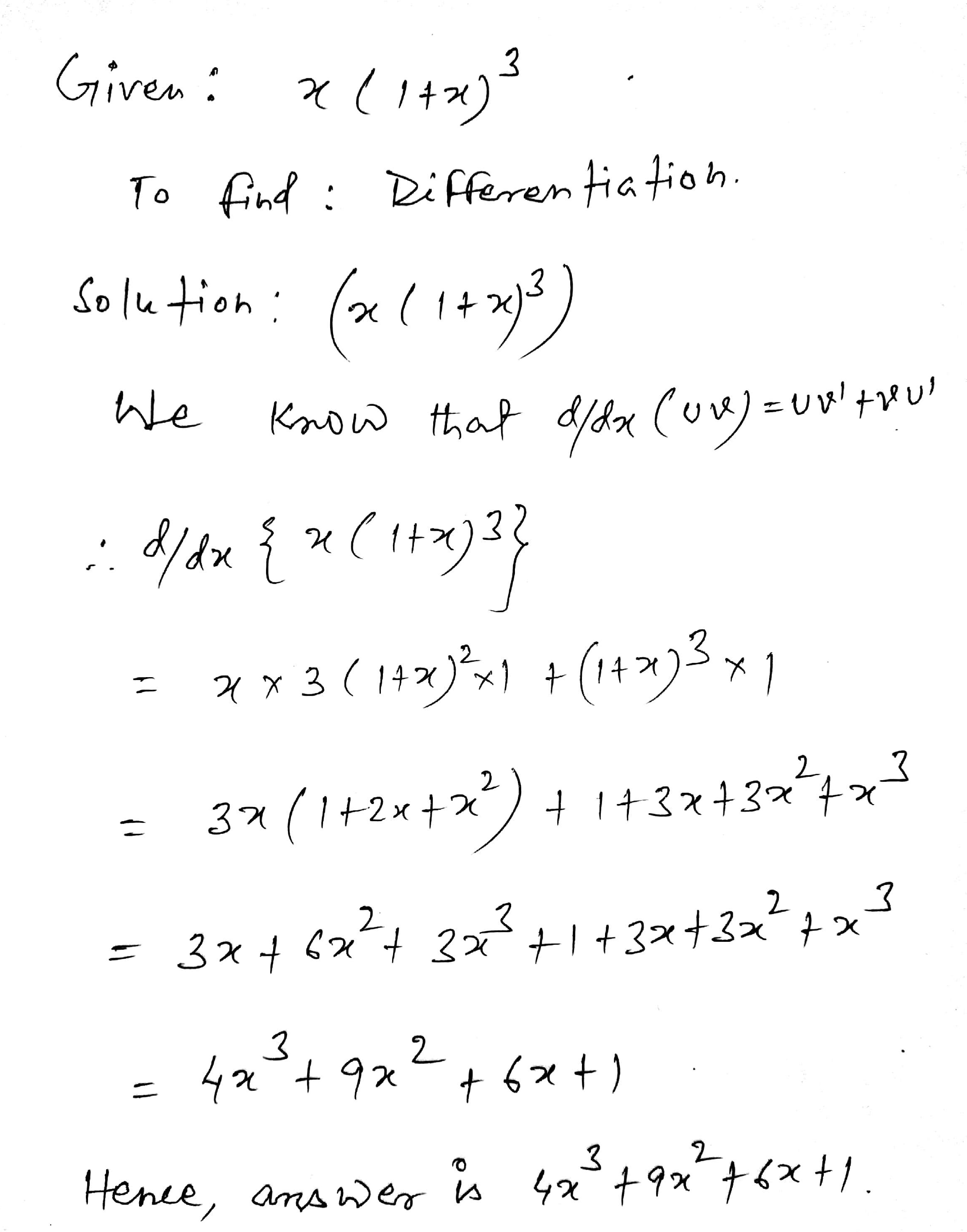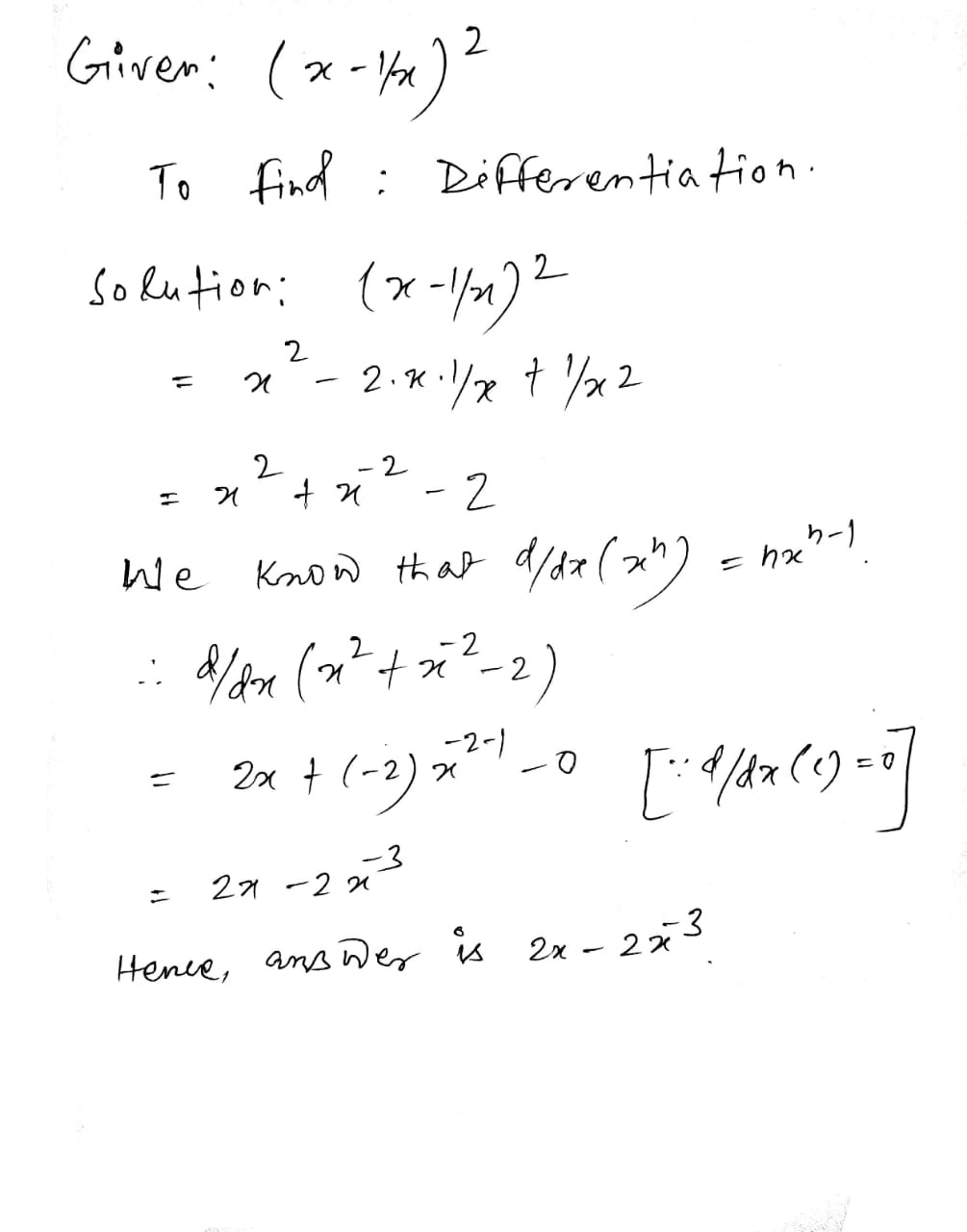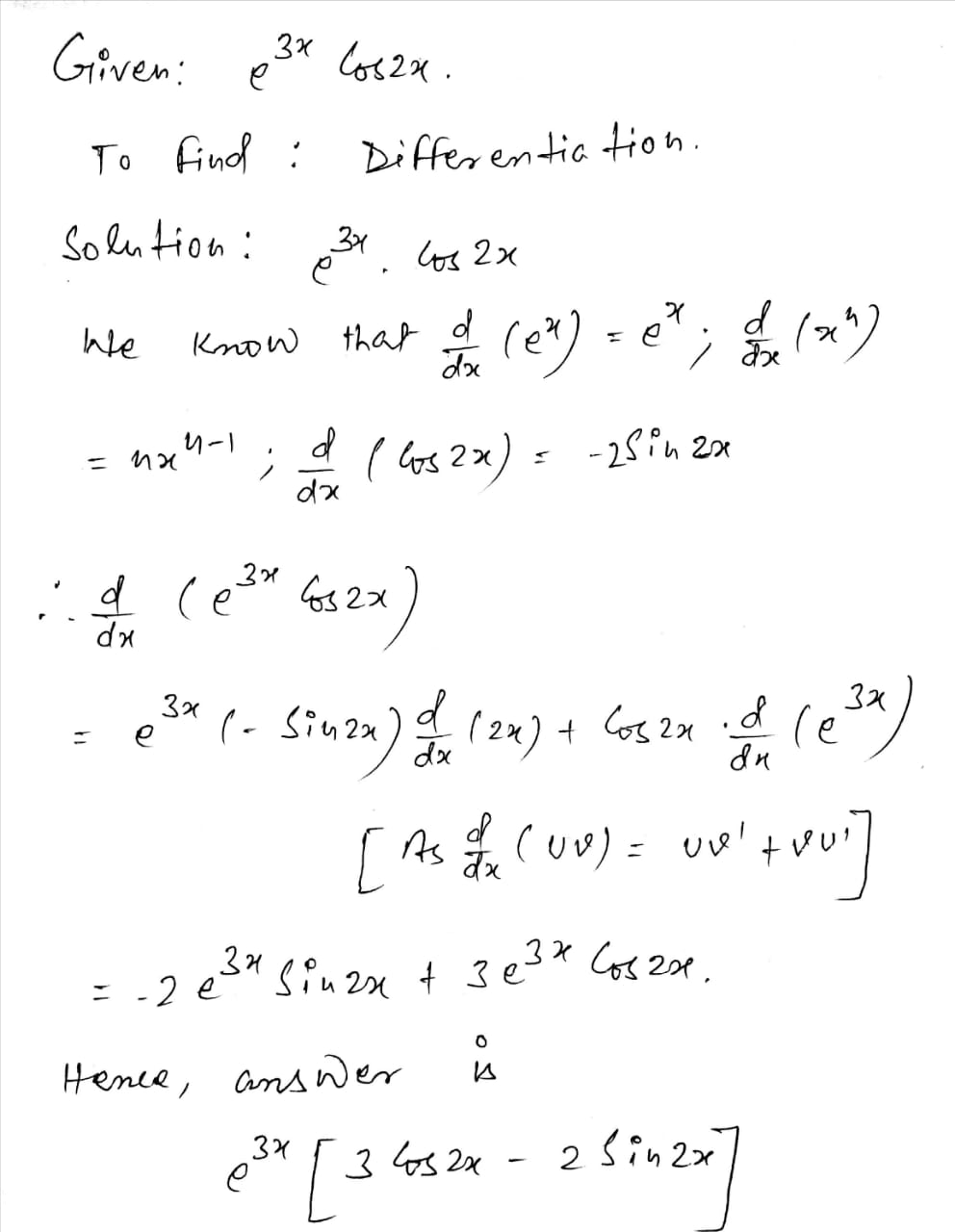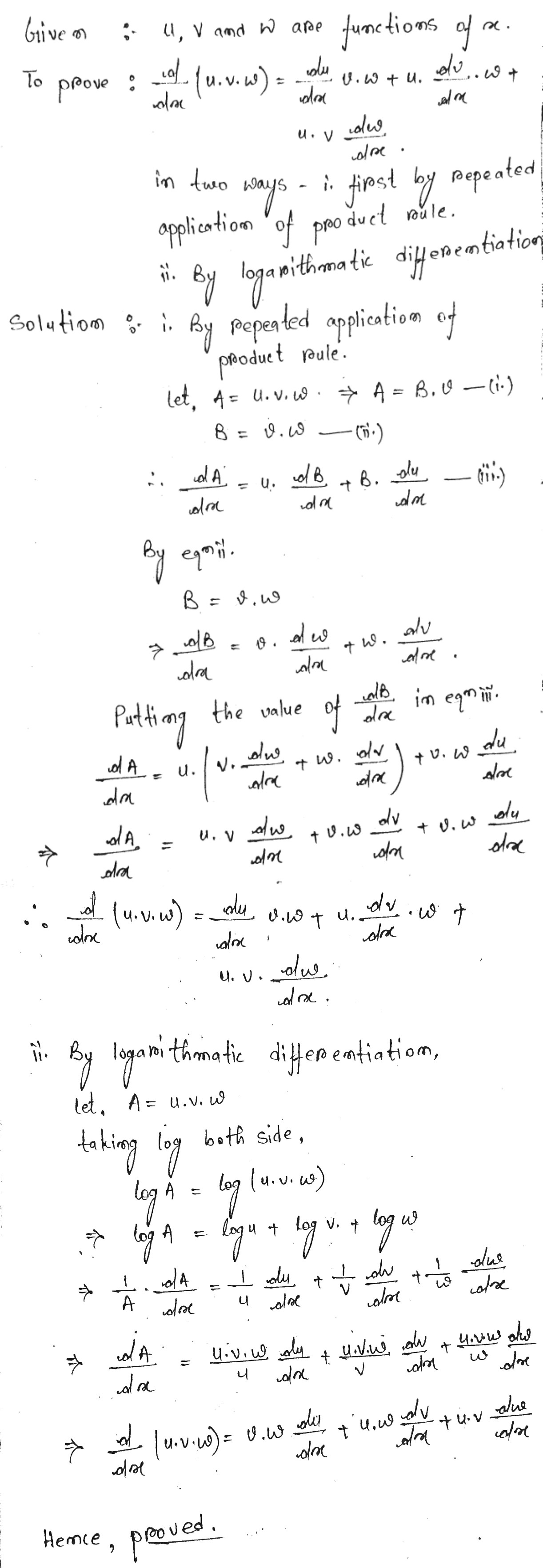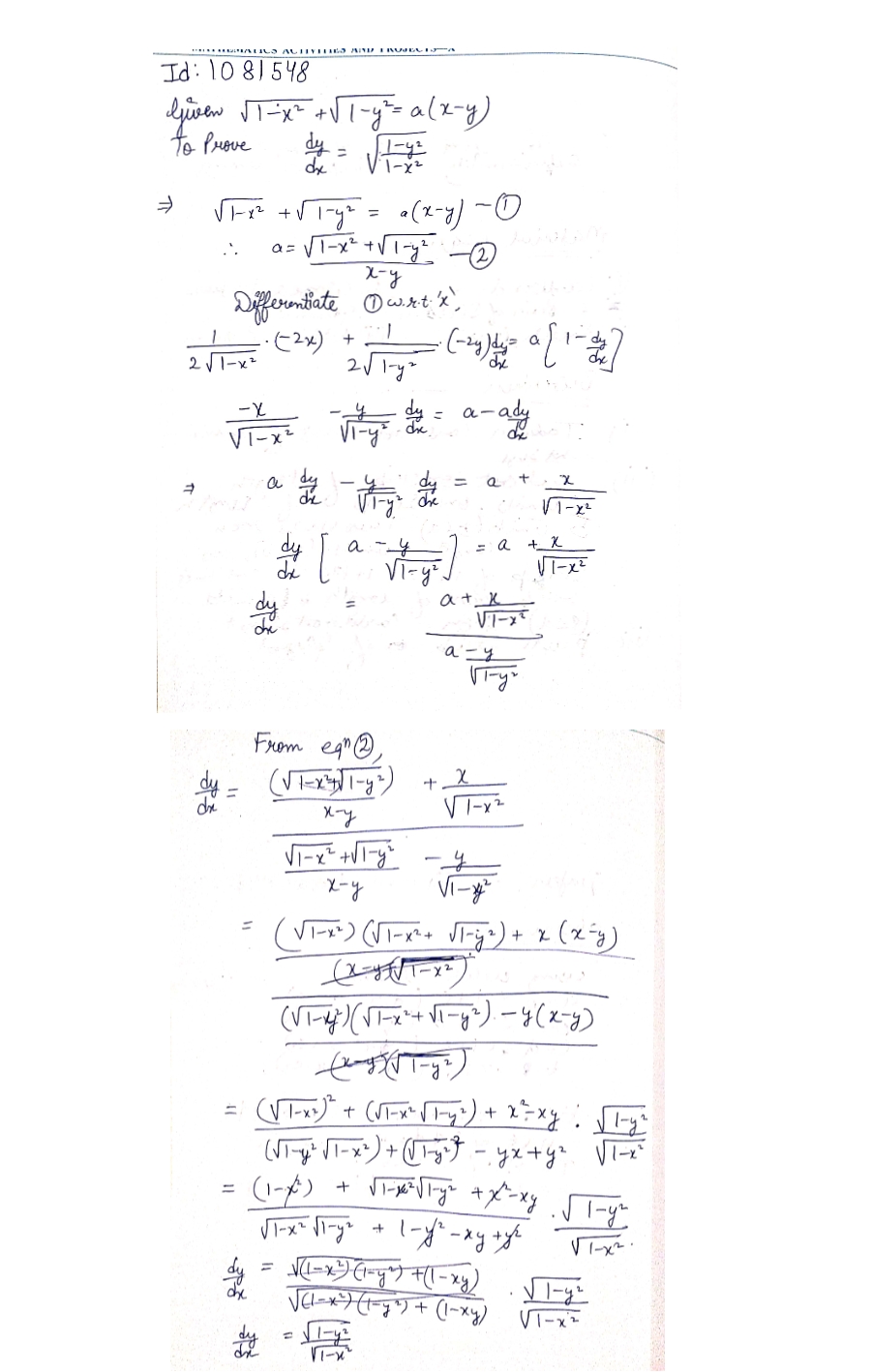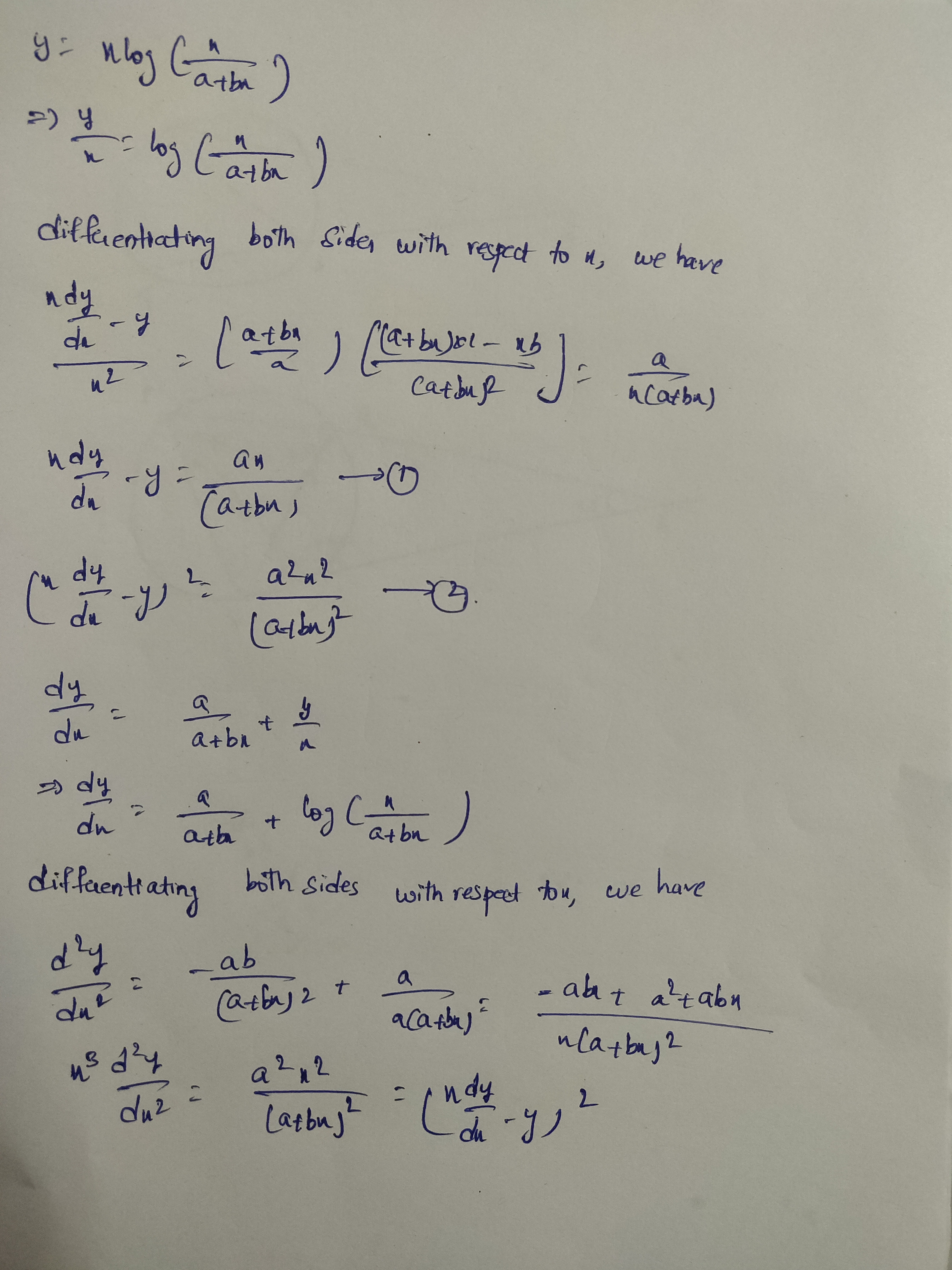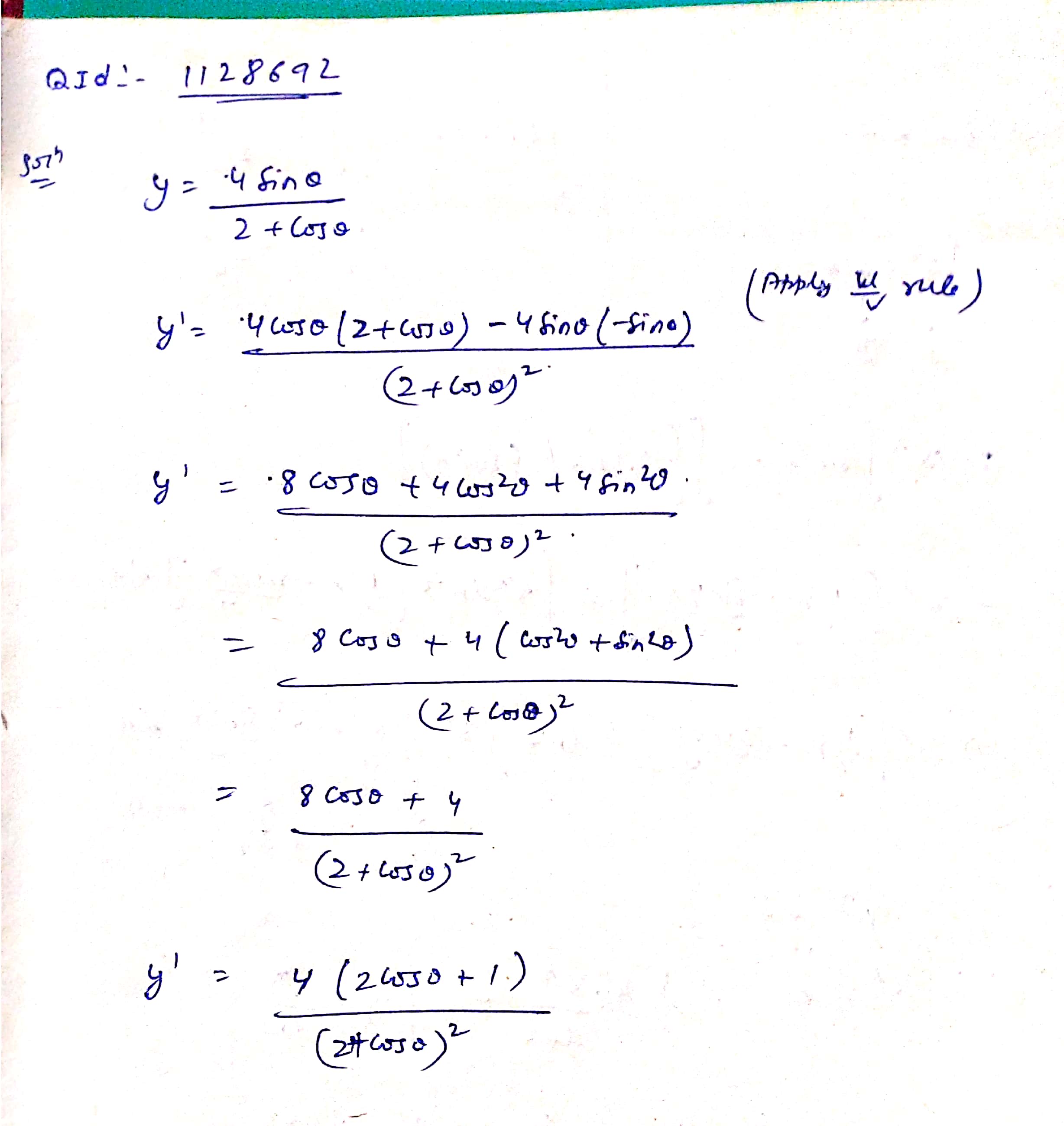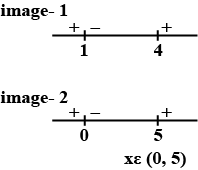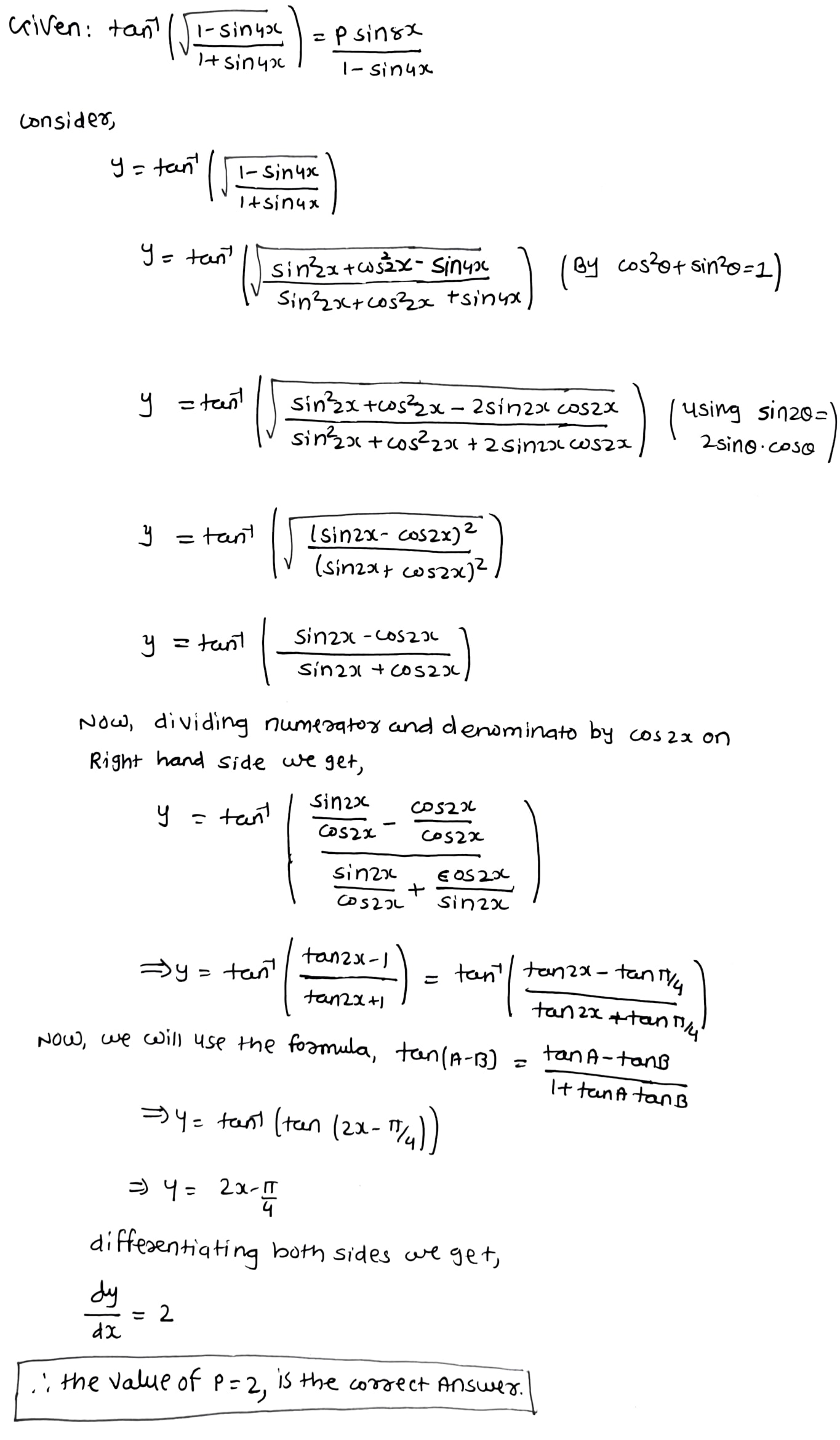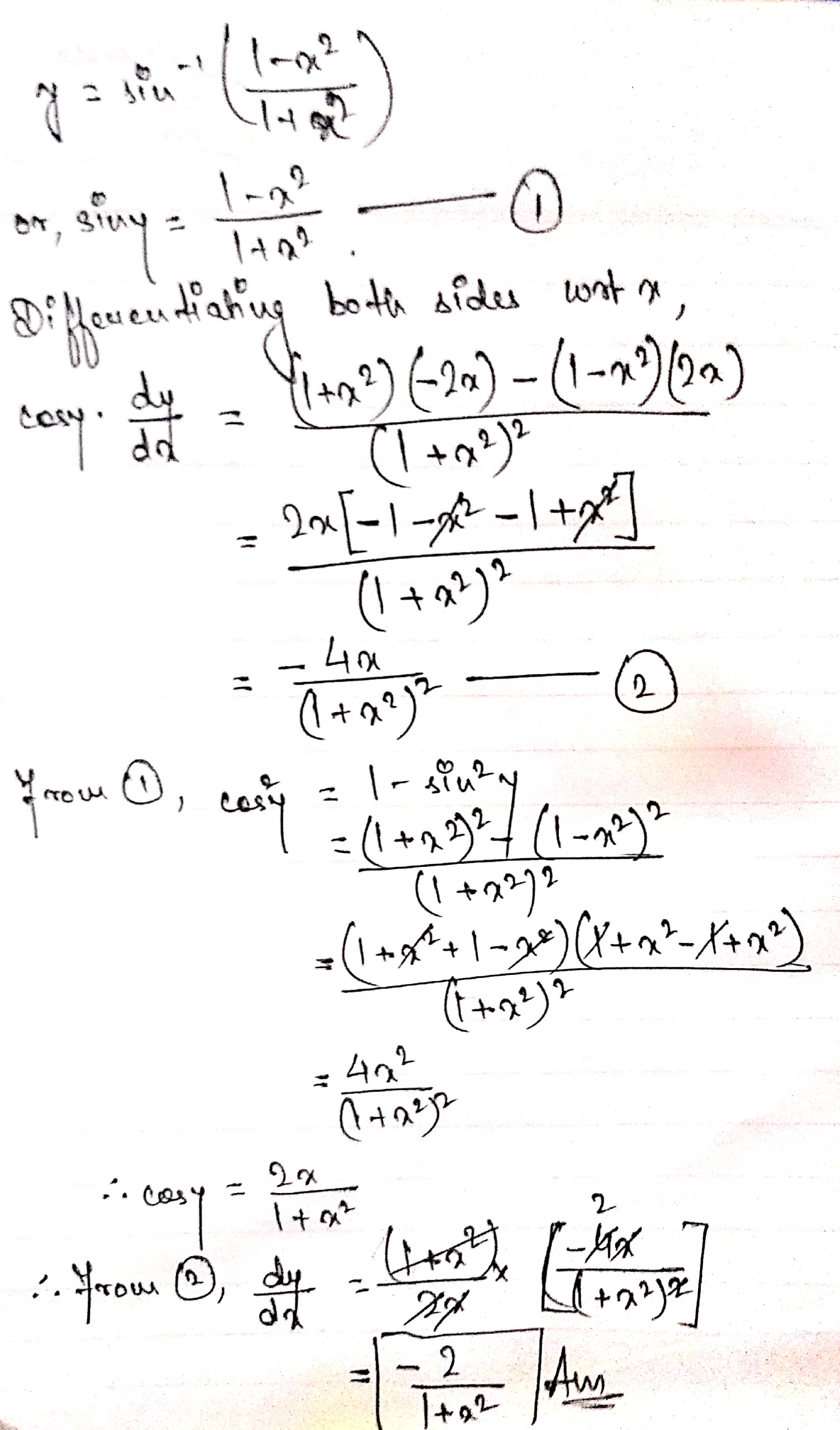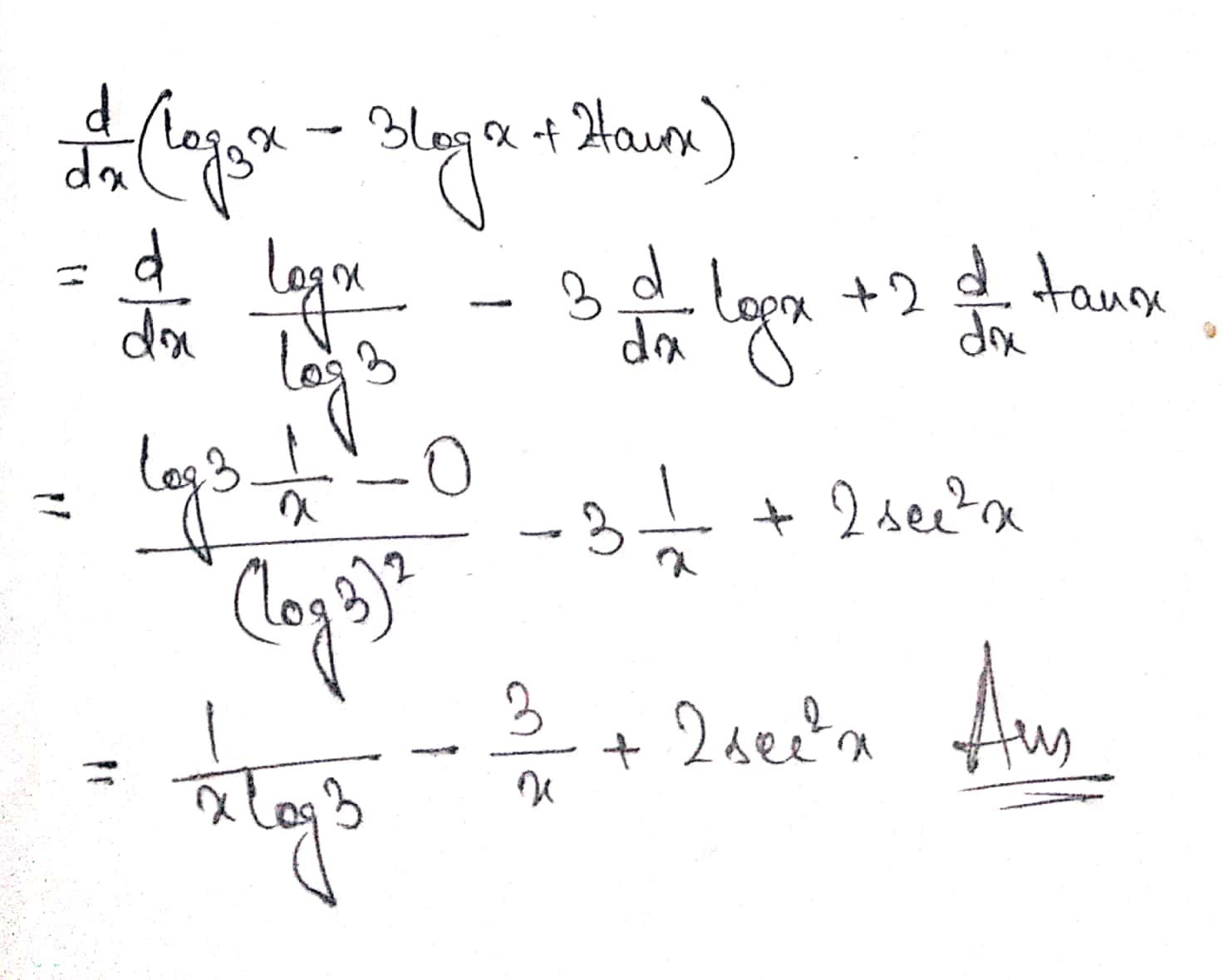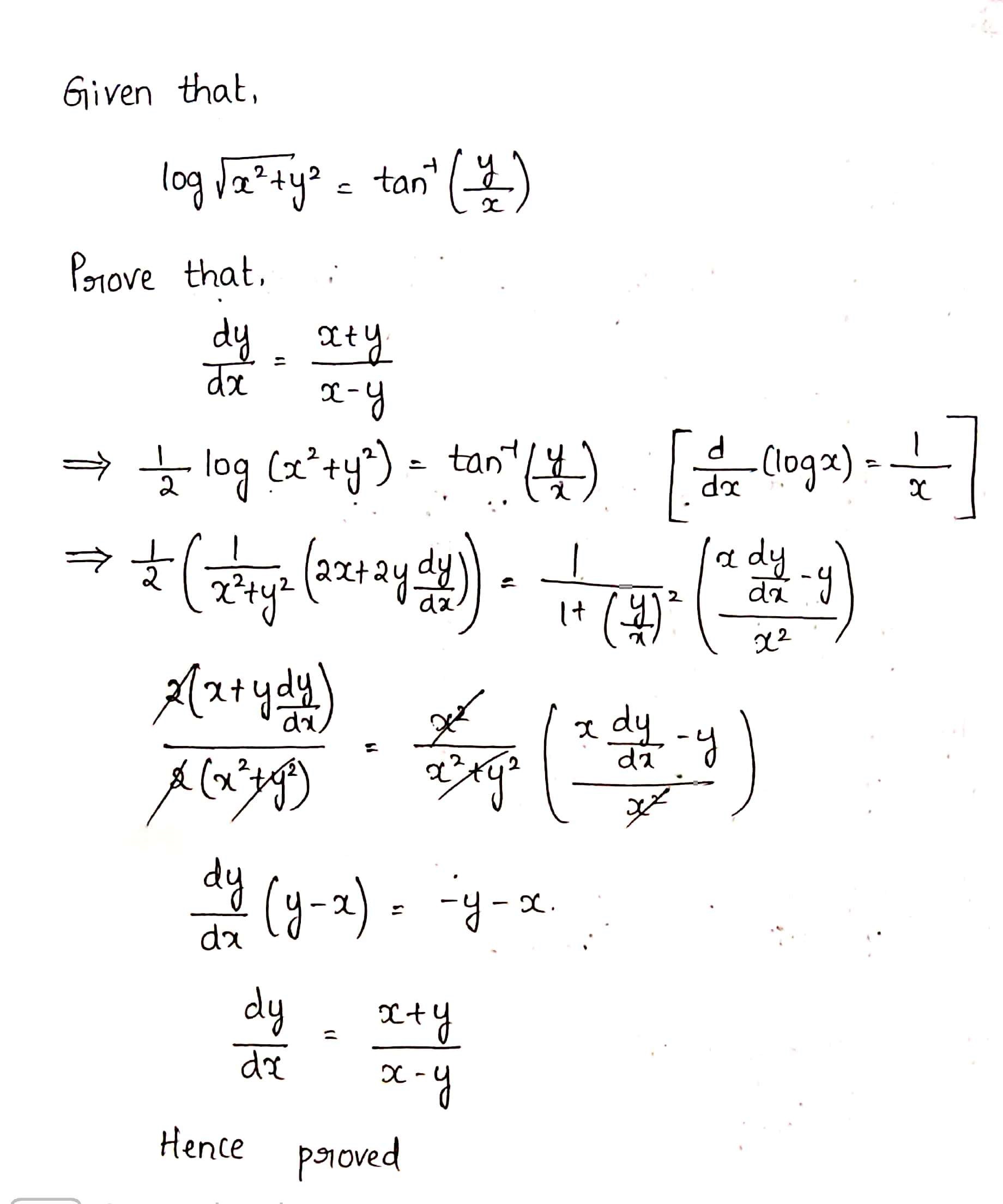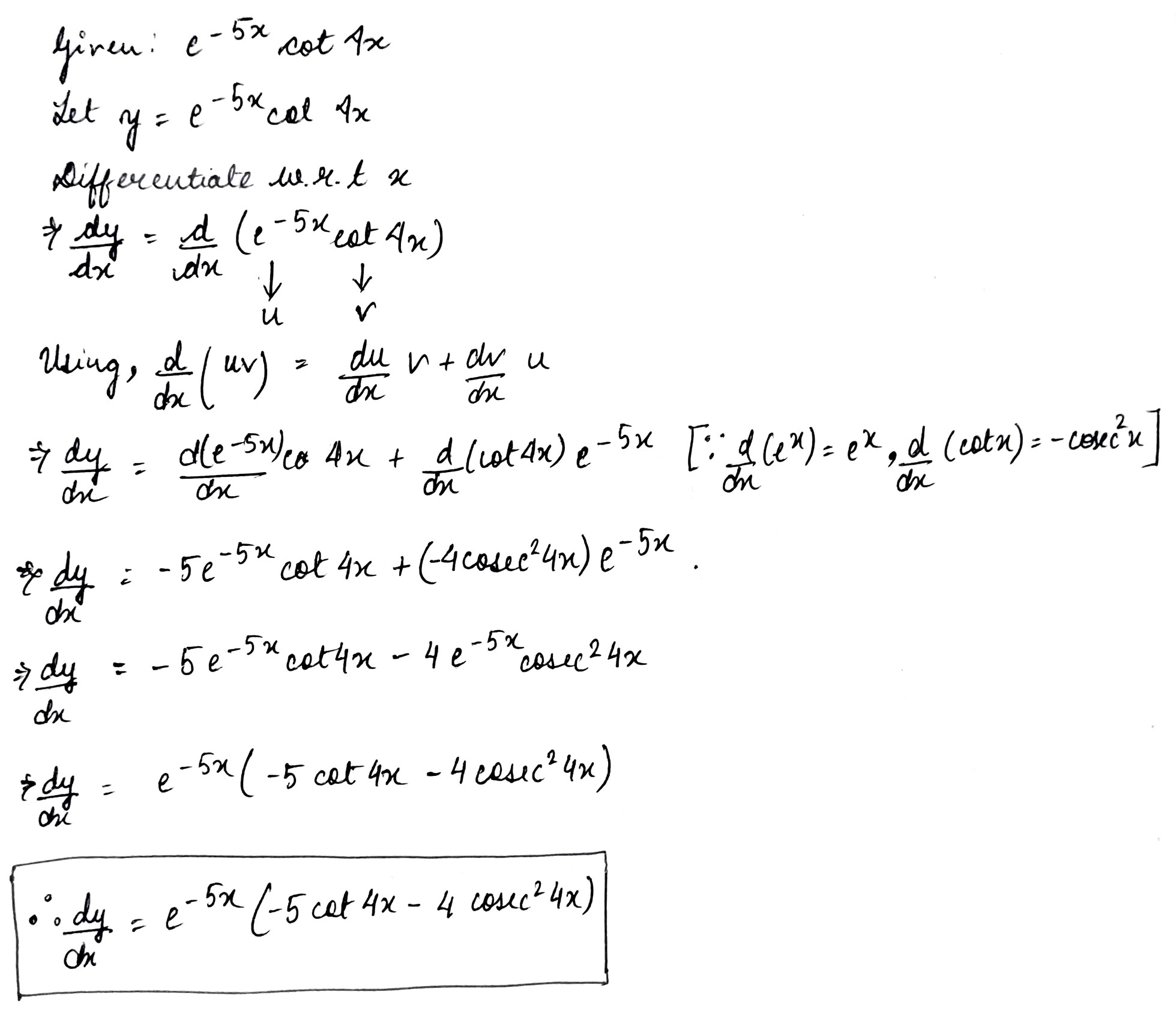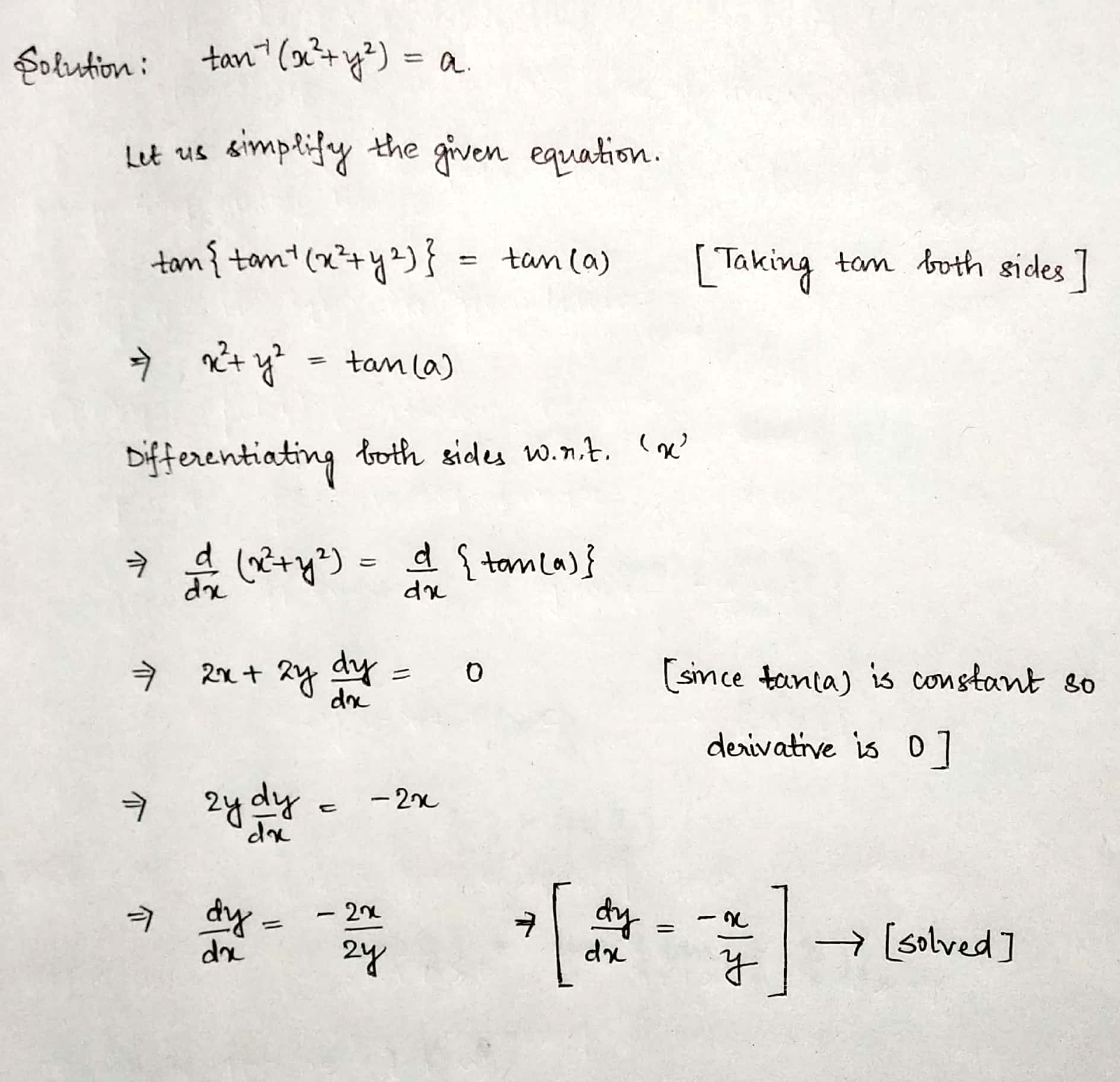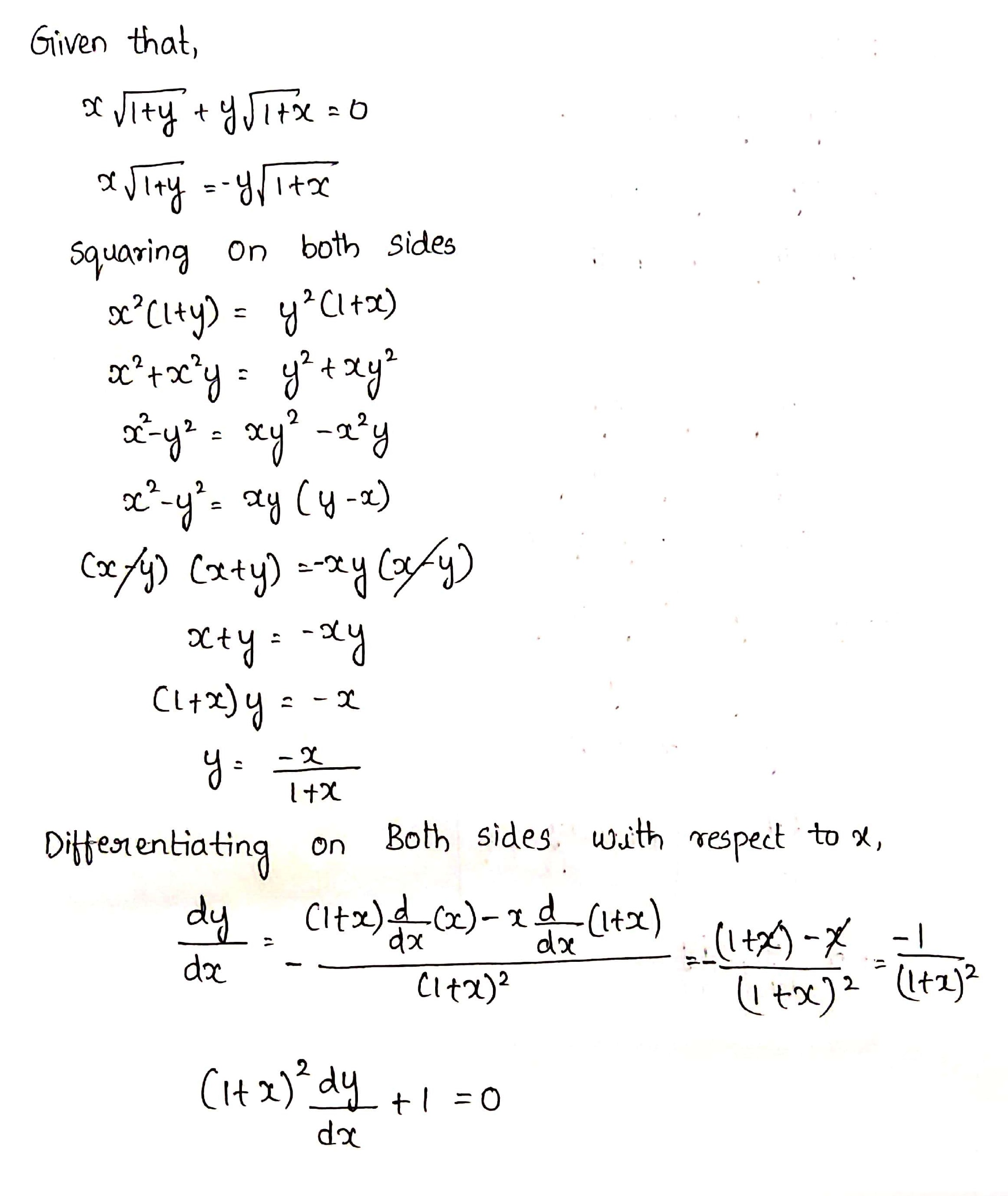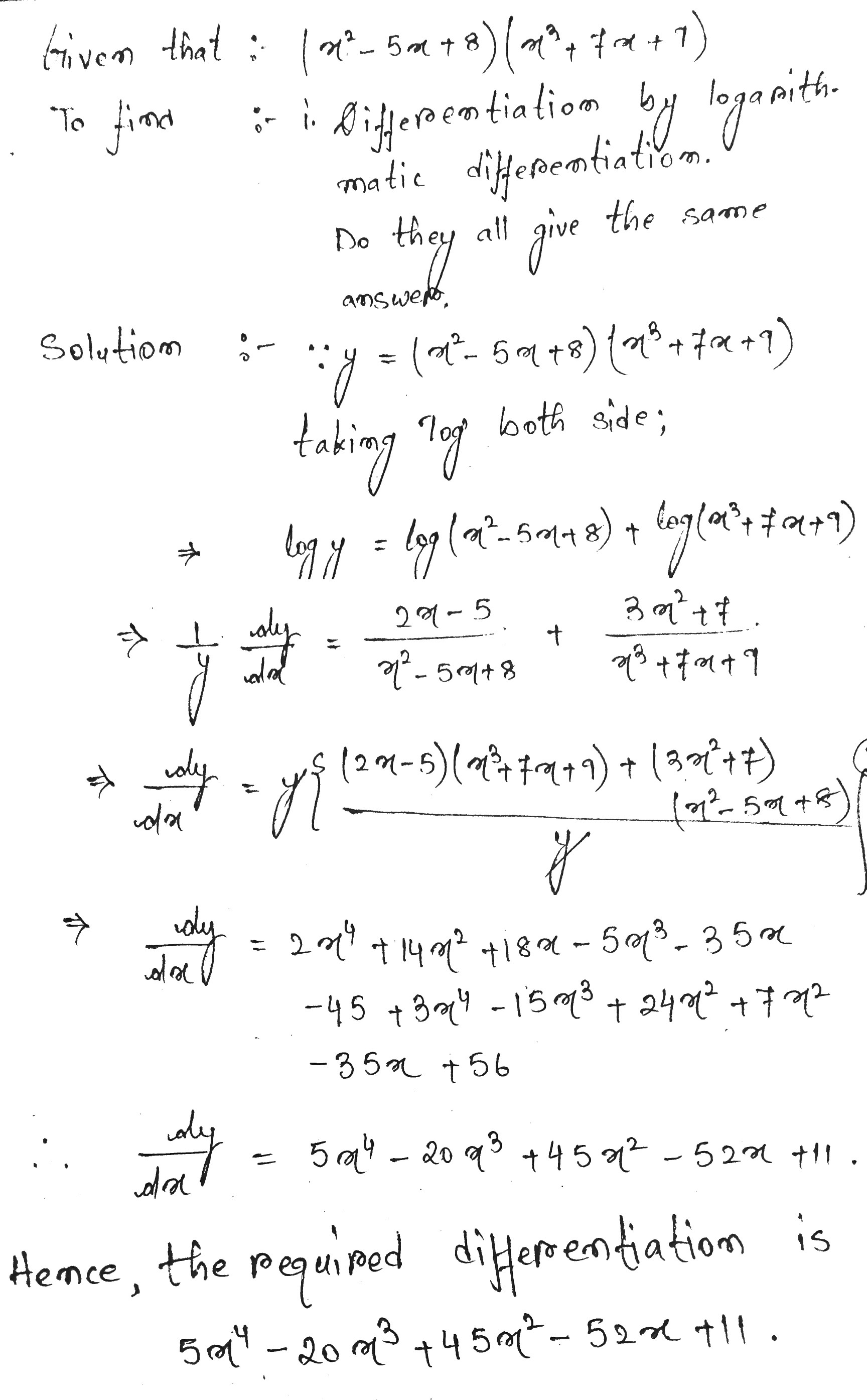Differentiation - Class 11 Commerce Applied Mathematics - Extra Questions
Find dydx of ax+by2=cosy
Find the derivative of the following functions: sinxcosx
Find dydx of 2x+3y=siny
Find dydx of xy+y2=tanx+y
Find the derivative of the function given by f(x)=(1+x)(1+x2)(1+x4)(1+x8) and hence find f′(1).
Find derivative of the following functions (it is to be understood that a,b,c,d,p,q,r and s are fixed non-zero constants and m and n are integers) : (x2+1)cosx
Differentiate the given function w.r.t. x:
sin3x+cos6x
If y=xx, then find dydx
Find the derivative of the following functions (it is to be understood that a,b,c,d,p,q,r and s are fixed non-zero constants and m and n are integers) : (ax+b)n(cx+d)m
If f(x)=tan2xtan3xtan5x, then prove that f′(x)=5sec25x−3sec23x−2sec22x
Find the dydx by implicit differentiation. x2−8xy+y2=8
Find dydx where x3+y3+3xy=7.
Differentiable log7(logx) with respect to x.
Find the value of f′(e) where f(x)=loge(logex).
y=√logx+√logx+√logx+_____ ∞ show that dydx=1x(2y−1).
If √x+√y=4 then find dydx at x=1.
Find dydx :
x+y2=logy+x2
If f(x)=|x−2|+|x−5| then find f′(4).
If y=3x2,Find dydx=?
If ey+xy=e, find y″
Find \dfrac{dy}{dx} when x^2 + y^2 = c^2.
\dfrac{{dy}}{{dx}}\, + \,\dfrac{y}{x}\,\,{\rm I}n\,y\, = \,\dfrac{y}{{{x^2}}}{\left( {{\rm I}n\,y} \right)^2}
Differentiate: \sqrt { \dfrac { \left( x-3 \right) \left( { x }^{ 2 }+4 \right) }{ { 3 }x^{ 2 }+4x+5 } }
If \sin y = x\sin (a + y) , then show
\dfrac{dy}{dx}=\dfrac{\sin \left( a+y \right)}{\cos y-x.\cos \left( a+y \right)}
Find \dfrac{{dy}}{{dx}},x = a\left( {\cos t + \log \tan \frac{t}{2}} \right),y = a\sin t
If e^x + e^y = e^{x+y}, find \dfrac{dy}{dx} .
Find \dfrac{dy}{dx} for y=e^{\sqrt{x}}.
Differentiate {\tan ^{ - 1}}\left( {\frac{{\sqrt {1 + {x^2}} - 1}}{x}} \right) with respect to {\sin ^{ - 1}}x
Differentiate with respect to x.
y = x\tan x
Differentiate the following w.r.t.x:
5^x\cdot \sec^{-1}2x
Differentiate x = \tan (e^{-y})
Find \dfrac {dy}{dx}\dfrac{{dx}}{{dt}} = ap\cos pt,\dfrac{{dy}}{{dt}} = - bp\sin pt
Differentiate the following w.r.t.x:
\sin^{-1}x+\cos^{-1}x
If y = {3^{2\log x + 7}} then \dfrac{{dy}}{{dx}}
Differentiate the following function:
{x}^{\log{x}}+{(\log{x})}^{x}
If y=\sin {\sqrt {1-x^{2}}}, then find \dfrac{dy}{dx}.
Find:
\dfrac{d}{{dx}}\left\{ {\dfrac{{5 + 4x}}{{x + 3}}} \right\}
If y = {a^{\dfrac{1}{2}{{\log }_a}\cos x}}. Find \dfrac{{dy}}{{dx}}
Find the derivative of f\left ( x \right )=1+x+x^{2}+--+x^{50}atx=1.
Find the derivate of \ {e^{\sqrt {2x + 1} }} with respect to x at x=12
If y = \sqrt x + \dfrac{1}{{\sqrt x }}, then show that 2x\dfrac{{dy}}{{dx}} + y = 2\sqrt x
Find the derivative of sin^{2}x with respect to x using product rule.
Let y=\log(\sin x) find \dfrac{d^2y}{dx^2}.
Find \dfrac{dy}{dx} , if x\ \sin\ y+y\ \sin\ x=0.
y=x^3-x^2-x+7 find x =? when \dfrac{dy}{dx}=0
Differentiate \log(sin\ x)(log\ x)
Differentiate: {\sin}^{2}{3x}.{\tan}^{3}{2x}
Find \dfrac {dy}{dx} for y= \left( \sin 20x+{{a}^{2x}}+10 \right) \\
If x\sqrt { 1-{ y }^{ 2 } } +y\sqrt { 1-{ x }^{ 2 } } =1, prove that \dfrac { dy }{ dx } =-\sqrt { \frac { { 1-y }^{ 2 } }{ { 1-x }^{ 2 } } . }
y=x^{3}-3x+2 Find \frac{dy}{dx} if the given function is continuous.
If {x^y} + {y^x} = {a^b} then show that \dfrac{{dy}}{{dx}} = - \left[ {\dfrac{{y{x^{y - 1}} + {y^x}\log y}}{{{x^y}\log x + x{y^{x - 1}}}}} \right]
Find \dfrac{dy}{dx} if xy=e^{x-y}
{\left( {{x^2} + {y^2}} \right)^2} = xy, then \dfrac{dy}{dx}
Find derivative of f(x)=x \cos x
If y\sqrt { { x }^{ 2 }+1 } =log\{ \sqrt { { x }^{ 2 }+1 } -x\} , show that { (x }^{ 2 }+1)\dfrac { dy }{ dx } +xy+1=0.
Find f'(-3) using definition if f\left( x \right) =\frac { 2x }{ x-3 }
Find \dfrac { d }{ dx } { \sin }^{ 3 }4x{ \cos }^{ 8 }5x
Differentiate xe^x from first principles.
If \cos (x+y)=y \sin x, then find \dfrac { dy }{ dx } .
Differentiate the following w.r.t.x.
\sqrt{x}.cotx
Find \dfrac{dy}{dx} :
\sin x +\cos y = 5x+4
Differentiate of the function x^{3}+y^{3}+3x^{2}y=a^{3} with respect to x.
Find \dfrac{dy}{dx} :
\sin x - 3x = 5y
If x^py^q=(x+y)^{p+q} then prove that \dfrac{dy}{dx}=\dfrac{y}{x}.
If f(x)=x+\log x find f^{\prime}(x)
Find drivative of y=(2-\sin x)(e^{x}+x^{3}+2) with respect to x.
Find \dfrac{dy}{dx} if 3x+4y=9
Find the derivative of \dfrac{x+\cos x}{\tan x}
Differentiate \sin^{2} x wrt x
Find \dfrac{dy}{dx}
y=\sin x.\ \cos x
f((x)=\log x+\sin x find f^{\prime }(x)
Differentiate with respect to x:
\ e^{-3x} \log (1+x)
If \sin\theta + 2\cos\theta =1 then prove that 2\sin\theta -\cos\theta=0.
Differentiate with respect to x:
e^x \log \sin 2x
Find \dfrac{dy}{dx} in the following:
4x+3y=\log(4x-3y)
Differentiate the following w.r.t. x:\cos x .e^{4x+5}
Let y=\log(1+\sin x) for 0\le x\le \dfrac{\pi}{2}, find \dfrac{dy}{dx}.
Differentiate with respect to x:
e^x\tan x
Differentiate x^{2} with respected to x^{3}.
Differentiate e^x \tan x with respect to x.
Differentiate the following functions with respect to x:
If y=\tan^{-1}\left (\dfrac {2x}{1-x^2}\right), x > 0, prove that \dfrac {dy}{dx} =\dfrac {4}{1+x^2}
If y=\log \sin x +e^x \tan x, then find \dfrac{dy}{dx}.
Differentiate w.r.t. x:\sin 5x \cos 3x
Find \dfrac{dy}{dx}, if y=e^x 5^x.
Differentiate w.r.t x :y=x^2 \sin 2x
Differentiate w.r.t. x :y=e^{3x-2} \sin 3x
Find \dfrac{dy}{dx}, if y=(3x+2)^x.
Find \dfrac{dy}{dx}, if 2x+3y=\sin x.
If y=x\sin (a+y), then prove that \dfrac {dy}{dx}=\dfrac {\sin^2 (a+y)}{\sin (a+y)-y \cos (a+y)}.
Differentiate w.r.t. x:\dfrac{x}{y^3}=1
Differentiate w.r.t. x:y=e^{3x} \sin 4x
Differentiate w.r.t. x:y=\sin x \sin 2x
If y=x^2 \tan x, find \dfrac{dy}{dx}.
Find \dfrac{dy}{dx}, if ax + by^2 =\cos y.
Differentiate w.r.t. x :y=(\cos x)(1-\sin^2 x)
If y=e^x+\sin x -4x^3, find \dfrac{dy}{dx}.
Solve the following differential equation.
\dfrac{dy}{dx}=3x
If x^3+y^3=3axy, find \dfrac{dy}{dx}.
If x^2+2xy+y^3=42, find \dfrac{dy}{dx}.
If x^2+y^2=t-\dfrac{1}{t} and x^4+y^4=t^ 2+\dfrac{1}{t^2}, then prove that \dfrac{dy}{dx}=\dfrac{1}{x^3y}.
If y=x\sin y, then prove that \dfrac {dy}{dx}=\dfrac {y}{x(1-x\cos y)}.
Is every differentiable function continuous? is every continuous function differentiable?
Find absolute value of dy/dx at x=1 if \displaystyle y^{x}.x^{y}=1
If f(x) is differentiable everywhere, then { \left| f(x) \right| }^{ 2 } is differentiable everywhere.( Enter 1 if true or 0
otherwise)
Given a function g which has derivative {g}'\left ( x \right ) for all x satisfying {g}'\left ( 0 \right )=2 and g\left ( x+y \right )=e^{y}g\left ( x \right )+e^{x}g\left ( y \right ) for all x, y\epsilon R, g(5)=32. The value of \dfrac{{g}'\left ( 5 \right )-2e^{5}}{16} is
Differentiate the function with respect to x
\cos x^3 . \sin^2 (x^5)
Find the derivative of the following:
(5x^{3} + 3x - 1)(x - 1).
Find the derivative of the following:
x^{-4} (3 - 4x^{-5}).
Find \displaystyle \frac{dy}{dx} of \sin^2 x + \cos^2 y = 1
Find \displaystyle \frac{dy}{dx} of x^3 + x^2 y + xy^2 + y^3 = 81
Find the derivative of the following functions (it is to be understood that a, b, c, d, p, q, r and s are fixed non-zero constants and m and n are integers) : (ax + b) (cx + d)^{2}
Find the derivative of \displaystyle x^{-3}\left ( 5+3x \right )
Find \displaystyle \frac{dy}{dx} of \sin^2 y + \cos xy = k
Find \displaystyle \frac{dy}{dx} of x^2 + xy + y^2 = 100
Find the derivative of the following:
x^{5} (3 - 6x^{-9}).
Find the derivative of the following functions (it is to be understood that a, b, c, d, p, q, r and s are fixed non-zero constants and m and n are integers) : (px + q)\displaystyle \left ( \frac{r}{x}+s \right )
Find the derivative of the following functions (it is to be understood that a, b, c, d, p, q, r and s are fixed non-zero constants and m and n are integers) : \displaystyle \cos ec\, x\,\cot \,x
Find the derivative of the following functions (it is to be understood that a, b, c, d, p, q, r and s are fixed non-zero constants and m and n are integers) : \displaystyle \left ( ax^{2}+\sin \,x \right )\left ( p + q \,\cos \,x \right )
Differentiate the given function w.r.t. x.
y=\displaystyle e^x + e^{x^2} + ... + e^{x^5}
Find \displaystyle \frac{dy}{dx} of \displaystyle y = \sin^{-1} ( 2 x \sqrt{1 - x^2} ) , -\frac{1}{\sqrt{2}} < x < \frac{1}{\sqrt{2}}
Differentiate the function w.r.t. x.
\displaystyle \sqrt{ \frac{(x - 1)(x - 2)}{(x - 3)(x - 4) (x - 5)} }
Find the derivative of the following functions (it is to be understood that a, b, c, d, p, q, r, s and s are fixed non-zero constants and m and n are integers) : \displaystyle x^{4}\left ( 5\,\sin \,x-3\,\cos \,x \right )
Find the derivative of the following functions (it is to be understood that a, b, c, d, p, q, r and s are fixed non-zero constants and m and n are integers) : \displaystyle \left ( x+\cos \,x \right )\left ( x-\tan \,x \right )
Differentiate the function w.r.t. x.
(x + 3)^2 . (x + 4)^3 . (x + 5)^4
Find the derivative of the following functions (it is to be understood that a, b, c, d, p, q, r and s are fixed non-zero constants and m and n are fixed integers) : \displaystyle \left ( x+\sec \,x \right )\left ( x-\tan \,x \right )
Differentiate (x^2 - 5x + 8)(x^3 + 7x + 9) in three ways mentioned below,
(i) By using product rule
(ii) By expanding the product to obtain a single polynomial
(iii) By logarithmic differentiation
Do they all give the same answer?
Find \dfrac{dy}{dx} of the function
x^y + y^x = 1
Find \displaystyle \frac{dy}{dx} of y^x = x^y
If x\sqrt {1+y}+y\sqrt{1+x}=0, for -1< x< 1, prove that \cfrac{dy}{dx}=\cfrac { 1 }{ { \left( 1+x \right) }^{ 2 } }
If \sin y = x \sin (a + y), then prove that \dfrac{dy}{dx} = \dfrac{\sin^2 (a+y)}{\sin a}.
If x^y + y^x = a^b, then find \dfrac{dy}{dx}.
Find \cfrac { dy }{ dx } where y=\log { \left( \sec { x } \right) \ \ } 0\le x\le \cfrac { \pi }{ 2 }
If x^y = a^x, prove that \dfrac{dy}{dx}=\dfrac{x\log_ea-y}{x\log_ex}.
Solve: \dfrac {dy}{dx} = \cos (x + y)
If y=f(x) is a differentiable function of x, then show that
\cfrac { { d }^{ 2 }x }{ d{ y }^{ 2 } } =-{ \left( \cfrac { dy }{ dx } \right) }^{ -3 }.\cfrac { { d }^{ 2 }y }{ d{ x }^{ 2 } }
Solution of differential equation x^2=1+(\dfrac{x}{y})^{-1}\, \dfrac{dy}{dx}+\dfrac{(\dfrac{x}{y})^{-2}\, (\dfrac{dy}{dx})^2}{2!}+\dfrac{(\dfrac{x}{y})^{-3}\,(\dfrac{dy}{dx})^3}{3!}+.... is
If (x^2+y^2)^2=xy, find \displaystyle\frac{dy}{dx}.
Differentiate the following functions w.r.t.x.
\sqrt{x+\displaystyle\frac{1}{x}}.
If y=1+x.{e}^{y}, show that \dfrac { dy }{ dx } =\dfrac { { e }^{ y } }{ 2-y }
Find the equation of the tangent to the curve y=\dfrac { x-y }{ \left( x-2 \right) \left( x-3 \right) } at the point where it cuts the x-axis.
If u and v are differentiable functions of x and if y=u+v then \cfrac { dy }{ dx } =\cfrac { du }{ dx } +\cfrac { dv }{ dx }
Calculate \displaystyle\, f\, (x) + f'\, (x) + 2, if f\, (x) = x\, \sin\, 2x
Prove the following identities
\displaystyle\, 2f'\, \left ( x +\tfrac{\pi }{3} \right )\, f'\, \left ( x -\tfrac{\pi }{6} \right )\, = f'\, (0)\, -\, f\, \left ( 2x +\tfrac{\pi }{6} \right ), where f\, (x) = \cos\, x
If y=(x^2+1)^5\sin 4x, find \dfrac{dy}{dx}.
Find the derivative of \displaystyle\, y \, =\, x\sqrt{1 \, +\, x^2}
If y=x^4+4^x+\log x-1, find \cfrac{dy}{dx}.
If x^3-y^3+\tan (xy)= \log (x+y), find \cfrac{dy}{dx}
Find the derivative of the following
(i) x^{x^n}+x^{n^x}(ii)\ log{\sqrt{x^2+1}}
If x = at^{4}, y = bt^{3}, then find \dfrac {dy}{dx}.
If y = 4x^{4} + 2x^{3} + \dfrac {5}{x} + 9, then find dy/dx.
If {1 \over 2}\left( {{e^y} - {e^{ - y}}} \right) = x , prove that
\cfrac { dy }{ dx } =\cfrac { 1 }{ \sqrt { { x }^{ 2 }+1 } }
y={ e }^{ \left\{ \sin ^{ 2 }{ x } +\sin ^{ 4 }{ x } +\sin ^{ 6 }{ x } +... \right\} }, then \cfrac { dy }{ dx } =
Differentiate the following
{ x }^{ 2 }{ (3x-2) }^{ 4 } \cos x
Differentiatef\left( x \right) = \ln \left( {1 + {x^2}} \right)
Let x^2y^3=(x+y)^5 then find \dfrac{dy}{dx}
If x^2+y^2+ 2gx + 2fy + 2hxy +c =0 find \frac{dy}{dx}
If y = \log \left[ {\dfrac{{x + \sqrt {{x^2} + 25} }}{{\sqrt {{x^2} + 25 - x} }}} \right] , find \dfrac{{dy}}{{dx}}
If y = sin^2(\log (2x + 3)), find \dfrac{dy}{dx}.
If {\left( {{x^2} + {y^2}} \right)^2} = xy, then \left (\cfrac{dy}{dx} \right ) is,
Let y=xe^x then prove that x\dfrac{dy}{dx}=(1+x)e^x.
Find \dfrac{{dy}}{{dx}}\,,\,if\,\,{x^{\dfrac{2}{3}}}\, + \,{y^{\dfrac{2}{3}\,}}\, = \,{a^{\dfrac{2}{3}}}.
\sqrt{\dfrac{x}{y}}+\sqrt{\dfrac{y}{x}}=4, Then \dfrac{dy}{dx}=
If \sin(x+y)=\log(x+y), then: \dfrac{dy}{dx}=
Find f'(x)
f\left( x \right) = \sqrt {{4^x} - {{\left( {44} \right)}^x}} + \frac{3}{{{{\log }_4}\left( {1 - x} \right)}}
Differentiate the following w.r.t. x:
e^{x^3}.
Let xy=x+y then prove that \dfrac{dy}{dx}+\dfrac{1}{(x-1)^2}=0.
Find \dfrac{dy}{dx} for y=\log\left(\dfrac{1-x^2}{1+x^2}\right).
If y = \dfrac{{{{\sin }^{ - 1}}x}}{{\sqrt {1 - {x^2}} }}, prove that \left( {1 - {x^2}} \right)\dfrac{{dy}}{{dx}} - xy = 1
If y={(2x+3)}^{(3x-5)}, find \dfrac{dy}{dx}.
Let f:\left[ {1,\infty } \right] \to \left[ {2,\infty } \right] if f\left( 1 \right) = 2. be differentiable function such that 6\int_1^x {f\left( t \right)dt = 3xf\left( x \right) - {x^3}} then the value of f\left( 2 \right) is....
If y={y}^{\sqrt{x}}+{x}^{\sqrt{e}}, find \cfrac{dy}{dx}
If y+\sin { y } =\cos { x } , find \cfrac { dy }{ dx }
Find \dfrac {dy}{dx} if y=\cos^{-1}(e^{x})+\sqrt {\sqrt {e^{\sqrt {x}}}}
If { x }^{ y }={ a }^{ x }.Prove \ that\ \cfrac { dy }{ dx } =\cfrac { x\log _{ e }{ a-y } }{ x\log _{ e }{ x } }
Solve: \dfrac{d}{dx}x\sin^2 x
Differentiate w.r.t x :
\dfrac { 3 }{ 4 } \log { { x }^{ 2 } }
If y = \dfrac{1}{{\sqrt {{a^2} - {x^2}} }}, find \dfrac{{dy}}{{dx}}
If y=tan x.log{sin x} then y' at x=\dfrac{\pi}{4} is?
If \sqrt{x}+\sqrt{y}=\sqrt{a} prove that \dfrac{dy}{dx}=-\sqrt{\dfrac{y}{x}}.
If y=\log _{ 5 }{ \left( \log _{ 7 }{ x } \right) } , find \dfrac {dy}{dx}
Find \dfrac {dy}{dx} at x=1,y=\dfrac {\pi}{4} if \sin^{2}y+\cos xy=k.
Differentiate the following w.r.t.x:
\sqrt{x} \cdot cosec^{-1}\left(\dfrac{1}{4x}\right)
If y^{2}=(x-c)^{3} , then find \dfrac{dy}{dx}.
If y=\dfrac{\sin^2x}{1+\cot x}+\dfrac{\cos^2x}{1+\tan x} then y^{'} is equal to?
Find derivative of (ax + b)^n (cx + d)^n
If x^y - y^x= 1 , then the value of \dfrac {dy}{dx} is :
Differentiate f(x) = \dfrac{{\log \left( {1 + 3x} \right) - \log x}}{{\left( {1 - 2x} \right)}}
If x=at^2 and y=2at, then find \dfrac{d^2y}{dx^2}.
{\text{if}}\;{\text{y = }}{{\text{e}}^{\text{x}}}{\text{ cos x,prove}}\;{\text{that}}\;\dfrac{{dy}}{{dx}} = \sqrt 2 {e^x}\cos \left( {x + \dfrac{\pi }{4}} \right)
Differentiate \sin^{2}\ 3x. \tan^{3}\ 2x
If y=sin^{-1}\left[2tan^{-1}\sqrt{\dfrac{1-x}{1+x}}\right] then find \dfrac{dy}{dx}.
y = 6{x^4} - 5{x^3} - 4{x^2}
Diff. with respect to x
Find \dfrac{{dy}}{{dx}} if y = {\left( {x + \dfrac{1}{x}} \right)^x}
If y = \dfrac{{{x^{\sin x}}}}{{1 + x + {x^2}}}, Find the \dfrac{{dy}}{{dx}}
{y^x} = {x^y}
If y=\dfrac{{\sin 4x}}{{{x^2} + 16}}, then find \dfrac {dy}{dx}
If y=\log (\dfrac{x}{a+bx})^x, prove that x^3\dfrac{d^2y}{dx^2}=(x\dfrac{dy}{dx}-y)^2
Find \cfrac{dy}{dx}, if y={ e }^{ \sin ^{ 2 }{ x } }\left\{ 2\tan ^{ -1 }{ \sqrt { \cfrac { 1+x }{ 1-x } } } \right\} .
The degree and order of differential equation \left(\dfrac{d^2y}{dx^2} \right)^2 =\left(y + \dfrac{dy}{dx} \right)^{\frac{1}{2}} is which of the following?
Find \dfrac{dy}{dx} for y = {e^x}\left( {a\cos x + b\sin x} \right).
Compute the derivative of 6x^{100}-x^{55}+x.
Find the derivative of \sin 2 x \cos 3 x
Find \dfrac{dy}{dx} for y=\dfrac{\tan x}{x}\log x^x.
If f (x) = 2017 \times tan x + 3x^{3}sinx+x^{2018}+2x^{3} then find f'(x).
Differentiate \dfrac{{e}^{x}-tan{x}}{cot{x}-{x}^{n}} w.r.t x.
Find \cfrac{dy}{dx}, if {x}^{2}+xy+{y}^{2}=100.
Find \dfrac{dy}{dx} of the following implicit functions :y^{3}-3y^{2}x=x^{3}+3x^{2}y
If y=\dfrac{\sin x+\cos x}{\sin x-\cos x} find \dfrac{dy}{dx}.
If \sqrt { x } + \sqrt { y } = \sqrt { a } , prove that \frac { d y } { d x } = - \sqrt { \frac { y } { x } }
If sin^2 x + cos^2 y = 1 find \dfrac{dy}{dx}
Differentiate the following:
(i) x ^ { 2 } \sin x(ii) x ^ { 2 } e ^ { x }
(iii) e ^ { \sqrt { a x + b } }
Differentiate w.r.t x in nx (1 + x)^{n - 1}.
If (x^2+y^2)^2=xy, then \dfrac {dy}{dx}.
Find \dfrac{dy}{dx} for y=\tan\sqrt{\sin x}.
If \cos y=x\cos\left(a+y\right), with \cos a\neq\pm1, prove that \dfrac{dy}{dx}=\dfrac{\cos^{2}\left(a+y\right)}{\sin a}.
Solve
\int \dfrac{x^{3}}{x^{3}+1}dx
If { 3x }^{ 2 }+4xy-{ 7y }^{ 2 }=0 Find (a)\dfrac { dy }{ dx } and (b)\dfrac { { d }^{ 2 }y }{ { dx }^{ 2 } }
x\sqrt{1+y}+y\sqrt{1+x} = 0 Show that: \dfrac{dy}{dx} = \dfrac{-1}{(1+x)^{2}}
Find \dfrac{dy}{dx} if y = \left(x + \dfrac{1}{x}\right)^x + {x}^{\left(x + \frac{1}{x}\right)}
If y=\tan(2x+3) find \dfrac { dy }{ dx }
If x\sqrt { 1+y } +y\sqrt { 1+x } =0, prove that \dfrac { dy }{ dx } =\dfrac { -1 }{ { (1+x) }^{ 2 } } .
Differentiate
x^{x\cos x}+\dfrac{x^{2}+1}{x^{2}-1} w.r.t.x.
Differentiate \log (x+\sqrt{a^{2}+x^{2}})
Let x^{3}+y^{2}=24. What is the value of \dfrac{d^{2}y}{dx^{2}} at the point (2,4)?
Find \dfrac{d}{dx} (x^{3} \log_{e}x)
Find \dfrac{dy}{dx}8x^{2}+9y=6x+2
Find \dfrac{dy}{dx} : 4x^{2}-\log x =y^{2}+\sin x -\cos x
Find \frac{dy}{dx}, if x^{y}=e^{x-y}
If x=y\sqrt {1-y^{2}}, then \dfrac {dy}{dx} equals to?
Differentiate:y=k{x}^{n}
Find \dfrac{dy}{dx} : \sin x +7x^{2}+y^{2}=5
If \sqrt{1-x^{2}}+\sqrt{1-y^{2} }=a find \dfrac{d y}{d x}
If y=3x^2-4x find \dfrac{dy}{dx}
Solve \frac{dy}{dx}=\dfrac{1}{cos (x+y)}
differentiate
y=log\left( { 3x }^{ 2 }+2x+1 \right)
Find derivative of f(x) f(x)=x\sin x
Find \dfrac{dy}{dx}, if {x}^{3}+8xy+{y}^{3}=64.
If x^3y^5 = (x + y)^8, then show that \dfrac{dy}{dx} = \dfrac{y}{x}
Find \dfrac{dy}{dx}, if x^3 + y^2 + xy = 10
If { xy }^{ 2 }=1, then prove that 2\dfrac { dy }{ dx } +{ y }^{ 3 }=0.
If y={ e }^{ { x+e }^{ { x+e }^{ { x+e }^{ x+...\infty } } } }, then prove that \dfrac { dy }{ dx } =\dfrac { y }{ 1-y } .
If y = {e^x}\cos x, then prove that \dfrac{{dy}}{{dx}} = \sqrt 2 {e^x}\cos \left( {x + \dfrac{\pi }{4}} \right).
Find \dfrac { dy }{ dx } , if y=\sqrt { 1+\sin 2x } .
If f(x) = 1 + x + x^{2} + ..... + x^{100} then find f'(1).
If y=\frac{a-x}{a+x}(x\neq -a), find \frac{dy}{dx}
Find \dfrac{{dy}}{{dx}} ,if {e^x} + {e^y} = {e^{x - y}}.
Differentiate the following functions with respect to x:
\dfrac {\sqrt {x^2+1}+\sqrt {x^2-1}}{\sqrt {x^2+1}-\sqrt {x^2-1}}
If xy=1, prove that \dfrac{dy}{dx}+y^{2}=0.
If xy \log(x+y)=1, prove that \dfrac{dy}{dx}=-\dfrac{y(x^{2}y+x+y)}{x(xy^{2}+x+y)}.
Find \dfrac{dy}{dx} in the following:
x^{5}+y^{5}=5\ xy
If y= x \sin (a+y), prove that \dfrac{dy}{dx}= \dfrac{\sin^{2}(a+y)}{\sin (a+y) -y \cos(a+y)}.
If \sin (xy)+\dfrac{y}{x}=x^{2}-y^{2}, find \dfrac{dy}{dx}.
A circular disc of radius 3 cm is being heated. Due to expansion, its radius increases at the rate of 0.05 cm/sec. Find the rate at which its area is increasing when radius is 3.2 cm.
Find \dfrac{dy}{dx}, if 2x+3y=\sin y.
Find \dfrac {dy}{dx}, when
x=a\left(1-\cos {\theta}\right) and y=a \left(\theta + \sin {\theta} \right) at \theta =\dfrac {\pi}{2}
Differentiate the following function with respect to x.
x^3\sin x.
Differentiate the following function with respect to x.
(1+x^2)\cos x.
Differentiate the following function with respect to x.
For the function f(x)=\dfrac{x^{100}}{100}+\dfrac{x^{99}}{99}+.....+\dfrac{x^2}{2}+x+1. Prove that f'(1)=100f'(0).
Differentiate the following function with respect to x.
\dfrac{a+b\sin x}{c+d\cos x}.
Find \dfrac {dy}{dx}, where xy^2-x^2y-5=0.
Differentiate the following function :
(2x+3)(3x-5)
Find \dfrac {dy}{dx}, where (x^2 +y^2)^2 =xy
Differentiate the following function :
ax^3+bx^2+cx+d, where a, b, c, d are constant.
Differentiate the following function :
x(1+x)^3
Differentiate the following function :
\left (x-\dfrac {1}{x}\right)^2
Differentiate the following function with respect to x.
x^4(5\sin x-3\cos x).
Let f(x) = ( x - 1) (x - 2) ( x - 3)..........( x - n), n \space \epsilon \space N and f'(n) = 5040, then the value of n is
Differentiate the following with respect to x:
e^{3x}\cos 2x
If x^{2}+y^{2}=R^{2}(\text { where } R>0) and k=\dfrac{y^{\prime \prime}}{\sqrt{\left(1+y^{\prime 2}\right)^{3}}}
then find k in terms of R alone.
Let f(x)=x+\dfrac{1}{2x+\dfrac{1}{2x+ \dfrac{1}{2x + \cdots \infty}}}
Compute the value of f(50) . f^{\prime}(50)
If f is a real function such that f(x) > 0, f'(x) is continuous for all real x and ax \ge 2 \sqrt {f(x)}-2a\ f(x), (ax\neq 2) show that \sqrt {f(x)}\ge \dfrac {\sqrt {f(1)}}{x}, x\ge 1.
Use the function f(x)=x^{1/x}, x > 0, to determine the bigger of the two number e^{\pi} and \pi^{e}
Differentiate the following w.r.t.x: \log \left[\tan ^{3} x \cdot \sin ^{4} x \cdot\left(x^{2}+7\right)^{7}\right]
If u, v and w are function of x , then show that
Undefined control /cfrac
in two ways - first by repeated aplication of product rule , second by logarithmic differentiation .
If ax^{2}+\dfrac{b}{x}\ge c for all positive x where a > 0 and b > 0, show that 27ab^{2}\ge 4c^{3}
If y=y(x) and it follows the relation 2e^{xy^{2}}+y \cos (x^{2})=4, then |y '(0)| is equal to
Let \displaystyle \left ( a-b\cos y \right )\left ( a+b\cos x \right )=a^{2}-b^{2} and \displaystyle \frac{dy}{dx}=\frac{\sin xf\left ( y ) \right )}{\left ( a+b\cos x \right )^{2}}. If a^{2}-b^{2}=192, then f\left ( \pi /2 \right ).
If \displaystyle y=\left ( x^{2}+1 \right )\sin x then \left ( \dfrac{\pi}2 \right )^{2}-y_{20}\left ( \dfrac{\pi}2 \right ) is equal to
Differentiate the following function with respect to x:
(\log x)^x + x^{\log x}.
If y = f(u) is a differentiable function of u and u = g(x) is a differentiable function of x, then prove that y = f(g(x)) is a differentiable function of x and \dfrac {dy}{dx} = \dfrac {dy}{du}\times \dfrac {dy}{dx}
If x^x + x^y + y^x = a^b, then find \dfrac {dy}{dx}.
If y = \tan^{2} (\log x^{3}), find \dfrac {dy}{dx}.
Find \dfrac {dy}{dx} if x\sin y + y\sin x = 0
Find the derivative of \displaystyle\, y = (x \, +\, 1)(x \, +\, 2)^2
Find the derivative of \displaystyle\, y = e^x(x^2 \, -\, 2x \, +\, 2)
Find the sum of \dfrac {1}{1 + x} + \dfrac {2x}{1 + x^{2}} + \dfrac {4x^{3}}{1 + x^{4}} + .... + \dfrac {2^{n} x^{2^{n} - 1}}{1 + x^{2^{n}}}.
If y = x^x + (sinx)^{cotx} . find \frac{dy}{dx}
If y = {\tan ^{ - 1}}\left( {\dfrac{a}{x}} \right) + \log \sqrt {\dfrac{{x - a}}{{x + a}}} \, , prove that \dfrac{{dy}}{{dx}} = \dfrac{{2{a^3}}}{{{x^4} - {a^4}}}
Differentiate x^{\sin x}, x > 0 with respect to x.
Differentiate the function with respect to x:
x^{\sin x} + (\sin x)^{\cos x}
If y=x^x+x^7+7^x+7^7, then \dfrac{dy}{dx}=?
Establish the following
If \sqrt{1-{x}^{2}}+\sqrt{1-{y}^{2}}=a(x-y) then \cfrac{dy}{dx}=\sqrt { \cfrac { 1-{ y }^{ 2 } }{ 1-{ x }^{ 2 } } }
x \cos (a + y) = \cos y
then prove that
\dfrac { dy }{ dx } =\dfrac { { \cos }^{ 2 }(a+y) }{ { \sin }_{ a } }
If y=xlog\left(\dfrac{x}{a+bx}\right) prove that x^3y_2=(xy_1-y)^2.
Evaluate:x^x-2^{\sin x}.
If x\sqrt {1+y}+y\sqrt {1+x}=0 and x \neq y, show that \dfrac {dy}{dx}=\dfrac {-1}{(1+x)^{2}}
Differentiate:
{ xy + y}^{ 2 } = \tan x + y ?
Differentiate y=\dfrac { 4\sin { \theta } }{ 2+\cos { \theta } } than \dfrac { dy }{ dx }= ?
f(x) = \sqrt {\log_{1/2}\left (\dfrac {5x - x^{2}}{4}\right )}.
Implict function { x }^{ 3 }+{ y }^{ 3 }=3axy
If, \sin ( x y ) + \frac { y } { x } = x ^ { 2 } - y ^ { 2 }.
Find \dfrac { d y } { d x }.
Differentiate w.r.t x :x^y +y^x =1
Differentiate wrt to x. { tan }^{ -1 }( \sqrt { \frac { 1-sin 4x }{ 1+sin 4x }}) = \dfrac {psin8x}{1-sin4x} then p=
If x = \dfrac{ t^2}{1 + t^2} , y = \dfrac{2at}{1 + t^2} then \dfrac{dy}{dx} =
Find \dfrac {dy}{dx} while:
x^{y}+y^{x}=a^{b}
If l^{2}+m^{2}=1, then find the maximum value of l+m.
y=\sin^{-1}\left(\dfrac{1-x^2}{1+x^2}\right), 0 < x < 1.Find\ \dfrac{dy}{dx}
\frac{d}{dx}(log_{3}x-3 log_{e}x+2 tan x)
If \log \sqrt{x^{2}+y^{2}}= \tan^{-1} \left(\dfrac{y}{x}\right), then prove that \dfrac{dy}{dx} = \dfrac{x+y}{x-y}.
Differentiate the following with respect to x:
e^{-5x}\cot 4x
Find \dfrac{dy}{dx} in the following:
\tan^{-1}(x^{2}+y^{2})=a
\tan^{-1}(x^{2}+y^{2})=a
If x \sqrt{1+y}+y \sqrt{1+x}=0, then prove that (1+x^{2}) \dfrac{dy}{dx}+1=0.
Find the derivative of the function given by
Differentiate ( x^{2} - 5x + 8) (x^{3} + 7x + 9) in three ways mentioned below :
by loagarithmic differentiation
Do they all give the same answer.
If \displaystyle y = \frac{ax^{2}} {\left (x-a\right )\left (x-b\right )\left (x-c\right )} + \frac{bx} {\left (x-b\right )\left (x-c\right )} + \frac{c} {x-c} + 1
prove that \displaystyle \frac{y^{'}} {y} = \frac{1} {x} \left (\frac{a} {a-x} + \frac{b} {b-x} + \frac{c} {c-x} \right ) (IIT-JEE, 1998)
Class 11 Commerce Applied Mathematics Extra Questions
- Basics Of Financial Mathematics Extra Questions
- Circles Extra Questions
- Descriptive Statistics Extra Questions
- Differentiation Extra Questions
- Functions Extra Questions
- Limits And Continuity Extra Questions
- Logarithm And Antilogarithm Extra Questions
- Mathematical And Logical Reasoning Extra Questions
- Number Theory Extra Questions
- Numerical Applications Extra Questions
- Permutations And Combinations Extra Questions
- Probability Extra Questions
- Relations Extra Questions
- Sequences And Series Extra Questions
- Set Theory Extra Questions
- Straight Lines Extra Questions
- Tangents And Its Equations Extra Questions
